PAPER ROUTE MEMORIES




PHILIP GUNN: ATHLETE










SOUPS THAT WARM THE SOUL







PHILIP GUNN: ATHLETE










SOUPS THAT WARM THE SOUL


A flurry of activity happened within and beyond the gates of NASA’s Stennis Space Center in 2022 as NASA continues exploring the secrets of the universe for the benefit of all.

The year began much like it ended – by testing RS-25 engines to help power NASA’s Space Launch System rocket on future deep space missions. Every RS-25 engine that will help power the SLS rocket at launch for Artemis missions will be tested at NASA Stennis, including those that will send the first woman and the first person of color to the Moon.
Between test series, NASA Stennis completed multiple upgrades to the Fred Haise Test Stand uniquely tailored for the RS-25 testing e ort. The projects included installation of new test stand piping, drilling a special flame bucket hole pattern to help cool RS-25 engine exhaust, and updating the stand’s thrust vector control and data acquisition systems.









Looking back at 2022, co-ops marked a huge victory in August when Congress passed a sweeping budget bill that included, for the first time ever, direct-pay tax credits they can use to deploy new energy technologies such as carbon capture, nuclear energy, energy storage, renewables and more. The legislation also created a voluntary $9.7 billion U.S. Department of Agriculture grant and loan program designed specifically for co-ops that buy or build new clean energy systems. — NRECA
Additionally, a vital component needed for Green Run testing of the Exploration Upper Stage to be used on future Artemis missions arrived at the B-2 Test Stand at NASA Stennis as teams continued preparation work.
At the same time, there was some notable testing activity in the NASA Stennis E Test Complex. NASA led and supported testing at the E-1 Test Stand and E-3 Test Stand for commercial companies such as Relativity Space, Blue Origin, Launcher Inc., Ursa Major, and Virgin Orbit. The NASA Stennis team conducted campaigns to test a range of rocket engine components throughout the year, and operations and design work for existing and new partners also is underway to support E Test Complex projects in 2023.


On another front, the Autonomous Systems Laboratory (ASL) at NASA Stennis continues to be a leader in the design and deployment of autonomous systems. NASA Stennis is working with other agency centers to create a concept for a lunar rover that will autonomously mine lunar raw materials for processing and use on the Moon.
In 2022, the Strategic Business Development O ce continued its work to promote the NASA Stennis federal city model and attract new companies on site. The center also received a prestigious agency award for its work as a leader in sustainability and energy use reduction.
St. Martin Upper Elementary School 4th graders recently learned about electric safety, and which tools a lineman uses to safely perform his job duties. Thanks to Singing River Metering Supervisor Brian Havens, Safety Coordinator Jason Hataway, and Construction Foreman Jason Hitt for sharing their knowledge!


How many of us remember dropping into a 4-County Electric Power Association o ce with our parents and grandparents to pay the light bill? Whether you do that in person, by mail, or online today, paying your monthly bill does a lot more than just keep the lights on.
Electricity keeps us connected to our modern world. Consider all the necessities and conveniences we enjoy in part because of the power lines running to the electric meter outside your home.
Count up your televisions, desktop, laptop and tablet computers, printers, your gaming consoles, music and video players, and personal assistant devices. Whether they get used every day or just occasionally, the electricity that keeps them working comes from 4-County.
Have you looked around your kitchen lately? Between the co ee maker and toaster and the microwave and electric skillet, a lot of us have added several other modern small appliances.
If you’ve got a craft nook or workshop, the power tools and machines you use to cut and shape your projects are either plugged in or recharged from the outlets connecting your household wiring to 4-County.
Even though we use electricity to run all these devices, we are still able to keep the lights on, use the stove, heating and air conditioning, and get hot water from the tap. The good news is, even as we rely more on electricity, it’s still a bargain, especially compared to other things we pay for regularly.
Since 2011, medical care, residential rental rates and education have increased at rates of 3 percent or more per year. Butter, meat, and egg costs have been up by more than one to 2 percent annually, and even bread costs have risen better than a half point on average. Electricity costs rise about 1 percent a year, but co-ops across the country have reported a decline in average residential use per household since 2010. That means we’re doing more things with less energy.
Kilowatt hour use per household dropped by 8 percent between 2010 and 2016, slightly less than the 9 percent decline reported by all electric utilities, nationwide.
When it comes to value, electricity is a clear winner, and we’re always looking for ways to work with you to make it even better. That’s why 4-County urges energy e ciency, promotes technology, and has programs designed to give members more control over their electricity use.
Energy performance dashboards, smart thermostats and power strips, and appliance settings that shift most water heating, laundry and dishwashing outside of peak rate periods help reduce the co-op’s overall power demand. They also give you opportunities to control or even trim your monthly utility bills.
That’s good for families, couples, and individuals trying to live within their budgets. And it’s going to become even more important as digital devices and internet-connected technologies become even more important in our lives. The average home now has 10 Wi-Fi connected devices. That number is expected to explode in the near future. Technology and the gateways that keep it working use electricity, so you’ll depend upon 4-County for more than the power that keeps the lights on.
That’s why we’re always working to provide service that’s reliable, keep it a ordable, and make it even more valuable to our member— you, your family, and your neighbors.
by Brian Clark CEO/General ManagerRecord numbers of packages, mailing constraints, and budget cuts are combining to delay mail deliveries around the country.
Anything that moves through the mail, including bills and payments, can be late in arriving, resulting in potential complications for members trying to pay their bills. Avoid these complications by taking advantage of a variety of payment options o ered by 4-County Electric Power Association.
The co-op has several ways to help you make sure that your bill — or your payment — isn’t late because of something out of your control.
Convenient payment options include:
• Online payments through 4-County’s website or mobile app

• Bank account/credit card monthly automatically drafts
• Use one of nearly 20 payment kiosks located in the service area
• Pay by phone, 1-800-431-1544
• Use the co-op’s new PayGo system at local Dollar General, Family Dollar, and CVS locations.
• Sign up for ebill or alerts to ensure timely payments

For more information on these and other options, visit our website at www.4county.org/residential-payment-bill-options/ or call us at 1-800-431-1544.

“Improving the quality of life for all those we touch.”
A Noxubee County organization is writing its own chapters for the local history books thanks to a generous grant from the 4-County Foundation.



The Noxubee County Historical Society (NCHS) recently received $10,000 from the 4-County Foundation to make some interior and exterior renovations to their 1950s-era building at the corner of 2914 Je erson St. in Macon.







NCHS President Anderson Thomas and Secretary Sharon Leslie Morgan say the former Pure Oil Gas Station is receiving a muchneeded facelift – and a new sign. “Money is hard to come by when you’re a non-profit organization,” Thomas explained recently. “The grant from 4-County has allowed us to upgrade our facilities,” for the work of preserving Noxubee County history, he added. The grant also allowed the non-profit organization to make kitchen renovations, add archival materials, and exhibition materials.
Thomas, Morgan, and other members of NCHS make a good team, the local history duo proclaimed. Thomas, whose family has lived in Noxubee County for decades, and Morgan, who moved to Noxubee County from upstate New York to explore her grandfather’s local ancestral history, bring unique perspectives to the county’s genealogical story.








They say it’s di cult to plan for the future without knowing the past. “It would be hard to accomplish what we have to do without organizations like 4-County,” Thomas said. “This is not something we can do for ourselves,” Morgan added. “We need the support.”

The local history organization, in existence since the 1960s, hopes to open its renovated building soon to area residents. “We hope to be open on a regular basis at some point in the future,” Morgan said. “We’re excited for our local citizens to know more about their county’s history.”
4-County believes in helping the communities it serves. That’s why the cooperative launched the 4-County Foundation, a community service program. Since February 2015, participating 4-County members’ utility bills have been rounded up to the nearest dollar; a $125.78 bill, for example, becomes $126. Now, that’s an average of only 49 cents per member, per month. That may not seem like much. But when you multiply those contributions by the thousands of member participants, that’s a lot of pennies!
For more information on the 4-County Foundation, call 1-800-431-1544.



Four new employees have recently joined the 4-County Electric Power Association/FASTnet team.

Donna Lott of Starkville has joined the FASTnet team as a Consumer Service Representative. Prior to 4-County, Donna served 28 years as an Administrative Assistant for the City of Starkville. She and her husband, Bill, have one grown daughter. They are members of Fellowship Baptist Church in Starkville.
Thomas Golson of West Point has joined the 4-County team as a System Engineer. He graduated from Mississippi State University with an Electrical Engineering degree. Thomas will be based at the Corporate Center.
Prior to 4-County, he worked with the family business, Golson and Son Construction Co. in West Point.
In his spare time, he enjoys hunting, fishing, and woodworking. He attends Vibrant Church in Columbus.


Dylan Wilson has joined the 4-County as Marketing Coordinator. He comes to 4-County after a three-year stint at Frontdoor, where he served as Marketing Specialist.
Dylan is a graduate of the University of Mississippi with a bachelor’s degree and master’s degree in Integrated Marketing and Communications. He and his wife, Ashley, live in Winfield, Ala., with their daughter, Renley, 14 months. In his spare time, he likes to spend time with family, travel, play golf, exercise, and play video games.
Drew Williamson of Columbus has joined 4-County as a Pre-Apprentice Lineman.
Prior to 4-County, Drew worked as a firefighter at City of Columbus Fire & Rescue. He also worked in the family business, Williamson Electric. Drew’s father, Andy, is a former 4-County employee, serving 26 years at the cooperative.
Drew attended East Mississippi Community College’s (EMCC) Electrical and Automation Program. He is a graduate of EMCC’s Emergency Medical Technician Program.
In his spare time, Drew enjoys hunting. He and his wife, Belle, live in Columbus.
Welcome to the 4-County/FASTnet team!

Key dates are upcoming for the 2023 4-County Electric Power Association Board election. Two seats, District 4 (Noxubee County, Incumbent Mike Banks) and District 7 (At-Large representing the entire membership, Incumbent Bill Bell) are on the ballot this year. The co-op’s nominating committee will announce their nominations Friday, March 31. The committee puts forth one candidate for each seat up for election. Other candidates can also run by completing a nomination by petition. The window for collecting signatures for the petition is Jan. 2-March 31, 2023. For a petition form and more information on the process, please visit our website at http://www.4county.org/nomination-by-petition-for-board-of-directors/ or call Jon Turner at 1-800-431-1544.









 Donna Lott
Dylan Wilson
Thomas Golson
Donna Lott
Dylan Wilson
Thomas Golson








biscuits and gravy.
In fact, it’s quite a recipe for success, according to Rodrick Eddie. “I appreciate my parents teaching me morals and the value of hard work. You learn those things on the farm,” explained the 4-County Network Engineer.
Those lessons have served Rodrick well through the years, he stressed. “Sometimes, as a kid, I felt like we spent all day in the hay field,” Rodrick remembered. Today — after earning college degrees, serving in the U.S. Navy overseas and beginning a successful IT career — his life has come full circle. He now looks forward to growing a herd of cattle on the same 70 acres of family land he grew up on in Okolona. “This is the place where I did all my chores, and where I raised horses and goats. I realize that those were some of the best days of my life.”
When he’s not piddling on the family farm, Rodrick lives in the Grand Oaks Community in Oktibbeha County with his wife, Chardae, and their two children, Rayleigh, 6, and Ahmir, 3. He and his family attend Chapel Grove East Missionary Baptist Church in Okolona.
Prior to 4-County he worked as a contract employee for C-Spire, and he worked five years for the City of Starkville as Assistant Network Engineer.
Rodrick has an Associate’s Degree in Computer Science from Northeast Community College, and he is a graduate of the University of Southern Mississippi with a Bachelor’s Degree in Network Engineering and a minor in Information Security.


He has served a total of 13 years as an active-duty sailor in the U.S. Navy and as a U.S. Navy Reservist (includes a deployment to Africa). The co-op employee said he always wanted to serve his country. “At the end of the day, we all benefit from it. It’s been a blessing and an honor,” he added.
When Rodrick gets a chance, he enjoys spending time with family, playing a friendly game of billiards with friends, cooking, and watching sports.
His interest in computers began as a child. His mother bought him his first computer when he was 13. “I was hooked,” he said. “I was intrigued by movies I had seen and by the things people were able to do with computers.”
Rodrick embraces his role at 4-County. “There’s a lot involved here. I’m learning a lot and able to grow so much. The technology here is pretty amazing. It leads to the opportunity for growth,” he stressed.
Family is important to him – his family at home and the one at his home away from home. “The camaraderie here is very much like that of a family,” he said. “Our CEO Brian Clark starts o meetings with a prayer. Things like that are important to me.”
Central Electric Power Association will hold its 86th annual membership meeting on March 21, 2023, at the Carthage Coliseum on Hwy 16 East in Carthage.
As pursuant to Central Electric Power Association’s bylaws and to provide each Central Electric member an opportunity to vote in a director election, the o cial ballot and proxy will be mailed to all Central Electric members the week of Feb. 20, 2023.


Enclosed will be an information sheet with “how-to-vote” details along with a self-addressed, postage-paid envelope for members to return their ballot or proxy. Your o cial ballot

must be received via mail no later than March 21, 2023. The election results will be published in the April issue of Today in Mississippi
In accordance with the laws of Mississippi and the bylaws of the association, members will elect three directors for threeyear terms: two directors from Leake County and one director from Attala County.
Mark your calendars for March 21, and we’ll see you at the annual meeting!
A tradition of dependable, hometown service since 1937by Miranda Boutelle










Because motors and pumps account for a significant amount of energy use on a farm, replacing ine cient motors with e cient models can save energy and reduce costs. Adding variable frequency drives (VFDs) allow you to vary the frequency and voltage supplied to the motor or pump to adjust the motor’s speed. This saves kilowatt hours and reduces load by only operating at the needed capacity. VFDs can be used in place of a phase converter, which allows use of three-phase power equipment where there is only access to single-phase power.
The importance of farms cannot be understated. Farmers feed our families and keep the country running, but the business brings many challenges, including risk and uncertainty. Finding ways to use less energy can reduce costs and result in energy savings for years to come.

Upgrade irrigation equipment to use less water, which means less pumping and reducing the amount of water and energy consumed. The goal is to get the right amount of water where it is needed. This can be accomplished by reducing evaporation through system design and fixing leaks in the system. GPS and geographic information system technologies allow for more specific irrigation targeting. Monitor and test systems regularly to ensure maximum e ciency.
The longer lights are on, the higher the potential for savings. Prioritize replacing incandescent or fluorescent exterior lighting on photocells or lights that stay on all night. LED lights last two to four times longer than fluorescents and 25 to 35 times longer than incandescents. That means less frequent replacement, which saves on materials and labor costs.
In climates where engine block heaters are used to keep vehicle engines warm enough to start, adding engine block heater controls with temperature sensors and timers will reduce electricity use. To keep water from freezing on farms with livestock, save energy by using stock tank heaters with thermostatic controls, which operate only when needed instead of running constantly. Insulated stock tanks may eliminate the need to heat water.
New farming technologies that o er e ciency possibilities include electric tractors, space heating and water heating. Equipment with information technology capabilities can aid e ciency by monitoring conditions and automating farming tasks. As with home e ciency practices, consider the equipment used most and the savings potential from upgrading or modifying existing equipment.

Conserving water at home can result in several downstream benefits and savings. Being mindful of home water use helps preserve the amount of water in our local reservoirs and reduces costs associated with water and wastewater treatment, including the cost of delivering it to the home (for those using a public water service).



Leaky toilets, showerheads, and dripping faucets can waste up to 2,700 gallons of water annually. Home water conservation can simply start by checking your house for any leaks and drips. Another simple way to conserve water is to limit running water when it isn’t necessary. For example, turn o the faucet while brushing your teeth, and defrost food in the refrigerator or in the microwave instead of placing frozen food under running water. Home gardens are another potential area for water conservation. Thoughtful planning can transform your home garden from a water drain to a water-e cient oasis. Start by planting drought-resistant plants or those with minimal water needs. Group the plants by similar water needs to avoid waste by watering from plant-to-plant. Additionally, a drip irrigation system for plants that require more water can boost e ciency by using less water over a longer period. Alternatively, set lawn sprinklers on a timer to limit water use and place them where the water will only reach plants, not pavement.

Another conservation option is to use a rain barrel to collect water for non-potable purposes. Harvested rainwater is an excellent option for watering ornate gardens and washing cars.
Another option for collecting water for the garden is to collect cold water that runs while you’re waiting on the water to heat. Every drop of running water you can utilize helps.



Reducing water use at home can also help lower your energy use. The Department of Energy estimates that water heating accounts for about 20% of a home’s energy bill. Switching to an energy e cient heat pump water heater can save considerable money on electric bills. Heat pump water heaters have higher upfront costs than storage tank models, but tax incentives and potential rebates can o set this cost. Check with your local electric cooperative to see if they o er rebates or a load management program.
If upgrading your water heater isn’t an option, there are small changes you can make to increase water heating e ciency. Reduce hot water use by switching to low-flow faucets and showerheads. You can also turn down the water heater thermostat to 120 degrees and insulate hot water lines to increase energy savings.

Additional ways to conserve both water and electricity in the home include upgrading clothes washers and dishwashers to newer, more energy e cient models. Running these appliances only when full or selecting a “light wash” setting reduces water and electricity use. Washing dishes by hand uses more water than an energy e cient dishwasher, so avoid this method when possible.

If your home uses well water, it’s important to be mindful of water conservation, particularly in drier climates. Well pumps run on electricity and can be a source of higher energy bills. Dry, over pumped wells can cause the pump to run continuously, using excess energy in the process. Malfunctioning well pumps also lead to spikes in energy use. Regular maintenance can help identify problems, such as leaks and faulty intake, which can lead to increased use of both water and electricity.
As you can see, there are a variety of changes — some large, some small — that can help you conserve water at home. Regardless of how you do it, thoughtfully managing water use can protect our water supply and make significant changes on energy bills.
As you can see, there are a variety of changes — some large, some small — that can help you conserve water at home.Harvested rainwater is an excellent option for watering ornate gardens and washing cars. Katherine Loving writes on consumer and cooperative a airs for the National Rural Electric Cooperative Association.








If you look around your home, you likely have more devices and equipment that require electricity than ever before. Our connected lives are increasingly dependent on more electricity to function. At the same time, as demand for electricity rises, Coahoma Electric Power Association must deliver an uninterrupted 24/7 power supply — regardless of market conditions or other circumstances.
As you would expect based on your family’s habits, electricity use fluctuates throughout the day based on consumer demand. Coahoma Electric Power Association must be able to provide enough electricity to meet the energy needs of all members during times of highest energy use or “peak hours.”




These peak times are typically in the morning as people start their day and in the evening as people return to their homes.

What you may not know is that electric utilities including Coahoma typically pay more for electricity — either from a power plant or from another utility with excess power — during those morning and evening “energy rush hours.”

In addition, the demand for electricity is even higher when it’s especially cold outside, when heating systems must run longer to warm our homes.



If the “peak times” concept is a bit puzzling, here’s an easy way to think about it, and it’s similar to a major concert. We know costs go up when there is strong demand for tickets (or electricity), and both are subject to the basic economic laws of supply and demand. When a lot of people want the same thing, it’s more expensive. When they don’t, it’s cheaper — like a bargain matinee or an “early bird” special at a restaurant.

During peak periods when the cost to produce and purchase power is higher, we encourage you to take simple steps to save energy, such as turning your thermostat down a few notches, turning o unnecessary lights and waiting to use large appliances during o -peak times.

You can also save energy by plugging electronics and equipment such as computers, printers, and TVs into a power strip, then turn it o at the switch during peak hours. If you have a programmable thermostat, adjust the settings to sync up with o -peak rate periods. When we all work together to reduce energy use during periods of high electricity demand, we can relieve pressure on the grid and save a little money along the way.
Another benefit of this timeof-use approach to electricity use allows greater control over your bill. Reducing the peak impacts the power-supply cost to every co-op member. This is particularly noticeable as energy costs have risen across the U.S. Collectively, everyone conserving energy and making small changes can truly make a di erence.




Remember, taking simple steps to save energy throughout the day and shifting energy intensive chores to o -peak hours is a smart choice for you and our community. Visit our website, coahomaepa.com, for more information.
 by W. Keith Hurt
General Manager
by W. Keith Hurt
General Manager








 by Qua’Shara Monix
by Qua’Shara Monix


When you think of February, the most common thoughts involve Groundhog Day (Feb. 2), with anticipation and fingers crossed hoping Phil doesn’t see his shadow, signaling an early spring.
Galentine’s Day (Feb. 13) is a day for women to celebrate their friendships with their lady friends.










Valentine’s Day (Feb. 14) is when we are reminded to show love for our significant other, friends, ourselves, as well as celebrate the recognition of our accomplishments. We also celebrate George Washington’s birthday on the third Monday in February thanks to the 1968 Uniform Monday Holiday Act.










Much less known, but near and dear to the hearts of many is National Love Your Pet Day. Feb. 20 is the day pet owners give their animal friends a little extra love. Pets provide the non-complex, simple love, availability, and presence we live for. They can help manage depression and loneliness by giving us companionship and in turn, feel love from their human companions. If you have a furry friend at home you know, firsthand, how much meaning and joy they can add to your life.

With a welcoming face to come home to everyday, it is important to make sure that you take the time to show them just how much you care. This month we’re lovingly giving a “Paws for Applause” for our fur babies at Coahoma Electric Power Association.
 BERNIE Eric Russell
MOLLY Rachel Pinkston
KITTY BELLE Kathie Serio DIXIE & DAISY Mike Dickerson
BRODY Eric Russell
CACTUS Christie Pearson
SWEAT PEA & DJANGO Shannon Pittman
BERNIE Eric Russell
MOLLY Rachel Pinkston
KITTY BELLE Kathie Serio DIXIE & DAISY Mike Dickerson
BRODY Eric Russell
CACTUS Christie Pearson
SWEAT PEA & DJANGO Shannon Pittman
























































Coahoma Electric Power Association will be collecting canned and other non-perishable items to donate to our local Care Station in Clarksdale.

The Care Station, which runs a mobile food bank, graciously welcomes donations and volunteers from the public.
The Care Station feeds walk-ins and provides them with food bags to take home.
The Care Station also delivers nutritional and warm meals to more than 300 households weekly.


We want to celebrate Coahoma Electric Supervisor of Engineering Services Hays Stubbs and Engineering Clerk Zelda Lawrence.


Thank you for your hard work and dedication!
We are lucky to have you on our team!




At Coast Electric, it’s our goal to be your trusted source for advice about energy use in your home or business. We aren’t quite like other utilities because our business model is di erent. Cooperatives like ours are not-for-profit organizations, so we don’t focus on profits, we focus on the people we serve. We are a local company, owned by the people we serve, governed by a board of members, with a local workforce. That means we can focus on what’s best for you, not investors who don’t live or work in south Mississippi.
We hope that when you have decisions to make about things like solar or making energy e cient improvements to your home, you reach out to us. We’ll give you straight answers and advice that will be beneficial to you and your family. We’ll give you straight answers about our industry and energy costs as well.
We know rising costs are coming, so we want to make sure you are equipped with tools to manage your energy use and combat

these costs. Our website, www.coastepa.com, is a great place to start. Our interactive tools and calculators will help you realize where your energy dollars are going. We will also soon start sending emails about half-way through your billing cycle that will tell you about your energy use for the first half of the month. This will allow you to adjust as needed before you receive a bill. We also have a great team of energy advisors on sta who are here for you. Information is power, and we want to empower you when it comes to your energy decisions in 2023 and beyond.






OPERATION ROUND UP R ROOUUNND D U UP P



Coast Electric wants you to reduce your energy use and see savings on your energy costs. Each month, you will have an opportunity to register to win a prize that will help you reduce the energy consumption in your home. All you have to do is visit www.coastepa.com and fill out our entry form. It only takes a few seconds, and you could win a prize that helps you save!
Charitable organizations that serve Ha Harrison or Pearl River counties could eligible for a grant of up to $10,000



Charitable organizations that serve Hancock, Harrison or Pearl R could be eligible for a gr 0,000!

Congratulations to Kaye Tootle, the winner of our January Reduce Your Use prize!
Since 2019, Operation Round Up has g back more than $1 million in grants tha the generosity of our members We than for supporting your local community an are excited to share that grant applica are available for the month of Februa
SCAN
HERE OR VISIT

APPLY
2023 | FEBRUARY 15
We’ve recently said a fond farewell to Coast Electric employees who have dedicated many years of their lives to serving co-op members and supporting the Coast Electric mission. We thank each of these employees and wish them well in the next chapter of their lives.
Additionally, we honored the following employees for their years of service.
20 YEARS
25 YEARS
30 YEARS
35 YEARS
40 YEARS





Coast Electric board member Paul D. Guichet has received the Credentialed Cooperative Director certificate from the National Rural Electric Cooperative Association (NRECA).

An ever-changing business environment has imposed new demands on electric cooperative directors, requiring increased knowledge of changes in the electric utility business, new governance skills and a solid knowledge of the cooperative principles and business model.
The NRECA Credentialed Cooperative Director program requires attendance and demonstrated understanding of the basic competencies contained in five core courses:
• Director Duties and Liabilities




• Understanding the Electric Business
• Board Operations and Process












• Strategic Planning
• Financial Decision Making
Paul is Coast Electric’s most recently-elected board member and joins his colleagues on the board in this achievement. Coast Electric board members help guide cooperative policy on behalf of their fellow members.





Higher prices for staples like groceries have affected households across our service area and, unfortunately, the electric industry has not escaped the impacts of inflation. The cost of materials like poles and transformers has increased greatly over the past months, as has the cost of generating power. That means costs for our members are increasing. Members can expect an increase of between 4-6% on their monthly bills starting March 1. Coast Electric will not profit from members’ increased costs. The cooperative, which is a not-for-profit organization, will only pass along increases to members to cover the cost of bringing electric service to homes and businesses in Hancock, Harrison and Pearl River counties. Members can access details about each of our rates on www.coastepa.com. Our interactive rate calculators allow members to see the components that make up their energy costs. The calculators will be updated March 1 to reflect new costs.
The below freezing weather we experienced during the Christmas holidays caused a spike in energy use for Coast Electric members, meaning many members have bills that are higher than normal. Why do extreme temperatures affect power bills? Our heating and cooling units are the biggest energy users in our homes. In the south, most of us have systems that are most efficient in warmer weather since we have more warm than cold days each year. That’s good news in the summer, but our incredibly efficient summertime units aren’t quite as efficient when temperatures drop.
In December, your heating system worked overtime to make up the difference between the outside temperature and your inside setting. Even if you kept your thermostat set at a recommended temperature, your unit worked much harder and used more energy. The increased use will be reflected on your bill. If you would like to see how temperatures affect your energy use and costs, log on to your account on www. coastepa.com. You will be able to see your use spikes when temperatures are extreme. You will also notice that your bill will be much lower during more temperate spring months when you can open your windows and turn on fans to make you feel cool.
If you need assistance with your Coast Electric bill, there’s help. You can apply for assistance through Share Your Blessings, a program funded though Operation Round Up. Operation Round Up rounds up participating members’ bills up to the next dollar amount each month. Of the donations received for Operation Round Up, 25% go to Share Your Blessings, a program administered by Catholic Charities. Contact Catholic Charities at 855-847-0555. 100% of Share Your Blessings funds go to help Coast Electric members.

















Coast Electric employees worked with the United Way of South Mississippi to participate in community service projects for the 2023 MLK Day of Service. Employees spent time volunteering at Manna Ministries in Pearl River County and at the Gulf Coast Center for Nonviolence in Harrison County. Dr. King once said, “everybody can be great, because everybody can serve.” Thanks to our employees who are serving their communities and honoring the legacy of Dr. King. Available

If you look around your home, you likely have more devices and equipment that require electricity than ever before. Our connected lives are increasingly dependent on more electricity to function. At the same time, as demand for electricity rises, Delta Electric must deliver an uninterrupted 24/7 power supply — regardless of market conditions or other circumstances.



As you would expect based on your family’s habits, electricity use fluctuates throughout the day based on consumer demand. Delta Electric must be able to provide enough electricity to meet the energy needs of all members during times of highest energy use or “peak hours.” These peak times are typically in the morning as people start their day and in the evening as people return to their homes.





What you may not know is that electric utilities including Delta typically pay more for electricity — either from a power plant or from another utility with excess power — during those morning and evening “energy rush hours.”






In addition, the demand for electricity is even higher when it’s especially cold outside, when heating systems must run longer to warm our homes.


If the “peak times” concept is a bit puzzling, here’s an easy way to think about it, and it’s similar to a major concert. We know costs go up when there is strong demand for tickets (or electricity), and both are subject to the basic economic laws of supply and demand. When a lot of people want the same thing, it’s more expensive. When they don’t, it’s cheaper — like a bargain matinee or an “early bird” special at a restaurant.

During peak periods when the cost to produce and purchase power is higher, we encourage you to take simple steps to save energy, such as


turning your thermostat down a few notches, turning o unnecessary lights and waiting to use large appliances during o -peak times.

You can also save energy by plugging electronics and equipment such as computers, printers, and TVs into a power strip, then turn it o at the switch during peak hours. If you have a programmable thermostat, adjust the settings to sync up with o -peak rate periods. When we all work together to reduce energy use during periods of high electricity demand, we can relieve pressure on the grid and save a little money along the way.
energy use during periods of high bill. Reducing the peak impacts
Another benefit of this timeof-use approach to electricity use allows greater control over your bill. Reducing the peak impacts the power-supply cost to every co-op member. This is particularly noticeable as energy costs have risen across the U.S. Collectively, everyone conserving energy and making small changes can truly make a di erence.



Remember, taking simple steps to save energy throughout the day and shifting energy intensive chores to o -peak hours is a smart choice for you and our community. Visit our website, deltaepa.com, for more information.
by David O’Bryan General Manager

Conserving water at home can result in several downstream benefits and savings. Being mindful of home water use helps preserve the amount of water in our local reservoirs and reduces costs associated with water and wastewater treatment, including the cost of delivering it to the home (for those using a public water service).





Leaky toilets, showerheads, and dripping faucets can waste up to 2,700 gallons of water annually. Home water conservation can simply start by checking your house for any leaks and drips. Another simple way to conserve water is to limit running water when it isn’t necessary. For example, turn o the faucet while brushing your teeth, and defrost food in the refrigerator or in the microwave instead of placing frozen food under running water.



Home gardens are another potential area for water conservation. Thoughtful planning can transform your home garden from a water drain to a water-efficient oasis.
Start by planting drought-resistant plants or those with minimal water needs. Group the plants by similar water needs to avoid waste by watering from plant-to-plant. Additionally, a drip irrigation system for plants that require more water can boost e ciency by using less water over a longer period. Alternatively, set lawn sprinklers on a timer to limit water use and place them where the water will only reach plants, not pavement.
Another conservation option is to use a rain barrel to collect water for non-potable purposes. Harvested rainwater is an excellent option for watering ornate gardens and washing cars.
Another option for collecting water for the garden is to collect cold water that runs while you’re waiting on the water to heat. Every drop of running water you can utilize helps.








Reducing water use at home can also help lower your energy use. The Department of Energy estimates that water heating accounts for about 20% of a home’s energy bill. Switching to an energy e cient heat pump water heater can save considerable money on electric bills. Heat pump water heaters have higher upfront costs than storage tank models, but tax incentives and potential rebates can o set this cost. Check with your local electric cooperative to see if they o er rebates or a load management program. Check with your local electric cooperative to see if they o er rebates

If upgrading your water heater isn’t an option, there are small changes you can make to increase water heating e ciency. Reduce hot water use by switching to low-flow faucets and showerheads. You can also turn down the water heater thermostat to 120 degrees and insulate hot water lines to increase energy savings.


Additional ways to conserve both water and electricity in the home include upgrading clothes washers and dishwashers to newer, more energy e cient models. Running these appliances only when full or selecting a “light wash” setting reduces water and electricity use. Washing dishes by hand uses more water than an energy e cient dishwasher, so avoid this method when possible.


If your home uses well water, it’s important to be mindful of water conservation, particularly in drier climates. Well pumps run on electricity and can be a source of higher energy bills. Dry, over pumped wells can cause the pump to run continuously, using excess energy in the process. Malfunctioning well pumps also lead to spikes in energy use. Regular maintenance can help identify problems, such as leaks and faulty intake, which can lead to increased use of both water and electricity.
As you can see, there are a variety of changes — some large, some small — that can help you conserve water at home. Regardless of how you do it, thoughtfully managing water use can protect our water supply and make significant changes on energy bills.




As you can see, there are a variety of changes — some large, some small — that can help you conserve water at home.Leaky toilets, showerheads, and dripping faucets can waste up to 2,700 gallons of water annually. by Miranda Boutelle











Because motors and pumps account for a significant amount of energy use on a farm, replacing ine cient motors with e cient models can save energy and reduce costs. Adding variable frequency drives (VFDs) allow you to vary the frequency and voltage supplied to the motor or pump to adjust the motor’s speed. This saves kilowatt hours and reduces load by only operating at the needed capacity. VFDs can be used in place of a phase converter, which allows use of three-phase power equipment where there is only access to single-phase power.
The importance of farms cannot be understated. Farmers feed our families and keep the country running, but the business brings many challenges, including risk and uncertainty. Finding ways to use less energy can reduce costs and result in energy savings for years to come.
The longer lights are on, the higher the potential for savings. Prioritize replacing incandescent or fluorescent exterior lighting on photocells or lights that stay on all night. LED lights last two to four times longer than fluorescents and 25 to 35 times longer than incandescents. That means less frequent replacement, which saves on materials and labor costs.
In climates where engine block heaters are used to keep vehicle engines warm enough to start, adding engine block heater controls with temperature sensors and timers will reduce electricity use. To keep water from freezing on farms with livestock, save energy by using stock tank heaters with thermostatic controls, which operate only when needed instead of running constantly. Insulated stock tanks may eliminate the need to heat water.
New farming technologies that o er e ciency possibilities include electric tractors, space heating and water heating. Equipment with information technology capabilities can aid e ciency by monitoring conditions and automating farming tasks. As with home e ciency practices, consider the equipment used most and the savings potential from upgrading or modifying existing equipment.

Upgrade irrigation equipment to use less water, which means less pumping and reducing the amount of water and energy consumed. The goal is to get the right amount of water where it is needed. This can be accomplished by reducing evaporation through system design and fixing leaks in the system. GPS and geographic information system technologies allow for more specific irrigation targeting. Monitor and test systems regularly to ensure maximum e ciency.
About 80% of U.S. farms are located in counties served by electric cooperatives. Check with your local electric co-op to see if they o er rebates on farming equipment and energy-e ciency projects that help reduce energy use. Improving e ciency on the farm can result in less energy use, lower bills and improved farming success during challenging financial times.
Miranda Boutelle is the vice president of operations and customer engagement at E ciency Services Group in Oregon, a cooperatively owned energy e ciency company.
Irrigation equipment can be upgraded to use less water, which means less pumping and reducing the amount of water and energy consumed. Photo Credit: Bonneville Power Administration Finding ways to use less energy can reduce costs and result in more e cient farming practices for years to come.



There is an old saying, “time flies when you’re having fun.” It’s hard to believe we are over two years into deploying DE Fastlink fiber internet. It seems like yesterday we were putting the pieces together, finding a way to bring this added layer of service to our members. Although we’ve faced many challenges during the process, bringing our members rural broadband and doing our part to bridge the digital divide has, indeed, been enjoyable.
I wanted to update you on where we currently are and where we are headed with our last phase of fiber deployment.
In December 2022, we connected our 10,000th subscriber with high-speed fiber-to-the-home internet. We celebrated this monumental milestone, which you will read about on page 16. In the same month, we also opened our last area in Phase 2 of our deployment process, o cially passing 23,712 homes and deploying more than 3,200 miles of fiber, with 46 percent of our members taking the service.
Phase 3, which is now underway, is the last portion of our fiber deployment. With five areas left to open in 2023, we anticipate all areas to be eligible for service by summer, which is almost two years sooner than initially projected. We know that waiting for this service has been di cult, but I’d like to personally thank our members for their patience as we’ve worked diligently to build this state-of-the-art system from the ground up.


The most fulfilling portion of this process is hearing from you, our members, on how this service has added value to you and your family’s lives. Access to reliable and a ordable high-speed internet has become more than a luxury; for many, it’s become a necessity. It’s been our honor and privilege to make this service available to our members with the added benefit of friendly, local customer service.






 by Randy Smith General Manager
by Randy Smith General Manager


“Powering communities and empowering lives” Dixie Electric is an equal opportunity employer and provider.
 by Amanda Mills
by Amanda Mills
On Dec. 9, 2022, DE Fastlink connected its 10,000th subscriber, Miranda Pickens, with high-speed internet, which was a monumental milestone. To celebrate this achievement, Dixie Electric held a celebration event at its headquarters on Thursday, Jan. 5.

In attendance were employees and honored guests who have been instrumental in the success of DE Fastlink. Local media were also invited to attend, and the event was livestreamed on DE Fastlink’s Facebook page for subscribers to attend online.
Dixie Electric General Manager Randy Smith gave a timeline review of DE Fastlink, from the formation in 2020 to its current status of 10,000 subscribers and 3,223 miles of fiber installed. Smith also thanked many for their contribution to the success of DE Fastlink, including the employees of Dixie Electric, who stepped up and took on the extra workload of two companies to provide this extra layer of service to its members. He also thanked Dixie Electric members for trusting them to provide the service, as well as for receiving it.

DE Fastlink Board of Managers member Alicia Walker spoke to the perfect timing of DE Fastlink when distance learning, telemedicine, and working from home were necessities and not available to rural Mississippians.
DE Fastlink subscriber Margarett Boyd of Ovett spoke about how her town felt like the forgotten part of Jones County when it came to access to internet service. She thanked Dixie Electric for seeing the need to provide this service for its members, stating how she needed this service for telemedicine for her elderly mother, distance learning for her special needs son, and to work from home. She also commended the professionalism and friendliness of the technicians and sta , who are prompt and eager to help when an issue arises.
Commissioner Dane Maxwell spoke to the Public Service Commission’s role in providing broadband funding. He also commended Dixie Electric and DE Fastlink for the pace at which they had provided this service to their members. To end the event, the Commissioner assisted in drawing for 25 di erent prizes awarded to active DE Fastlink subscribers.
by






 Amanda Mills
Amanda Mills

For many years, members were greeted by the sweet, cheerful, and courteous voice of Regina Hales as they walked through the front lobby of the Laurel o ce.
Regina came to work for Dixie Electric in August 1993 as the receptionist. She answered all phone calls, assisted members with billing questions, opened and prepared the mail, and performed many other daily duties.

Although Regina excelled at her daily job requirements, it was her positive, infectious spirit that brought the most value to her role at Dixie Electric.


“Regina’s positive attitude, smile, and laughter are contagious,” said Communication Specialist Amanda Mills. “She was our ray of sunshine at Dixie Electric, and she will very much be missed by our employees and members alike. She is one-of-a-kind, and her absence is felt by all.”
In February 2015, Regina was promoted to the Administration and Finance Administrative Assistant, where her job duties included employee benefits, budget billing, medical necessity alerts, preparing invoices, and a host of other responsibilities.


“When looking back on my career, two major milestones stand out,” said Hales. “The first would be Hurricane Katrina because the devastation it caused was life changing. The second is the formation of DE Fastlink. Everywhere I go, someone asks me when they will receive internet. This lets me know of the great need and demand for high-speed internet that we can provide for our members.”
“Regina walked into the o ce with the same overwhelmingly joyous attitude every day,” said Administration and Finance Manager Aaron Zumwalt. “She truly is the standard we should hold ourselves to in our attitude towards our work. Dixie Electric is a better place because of her example, and we will all miss her."
After 29 years of service to Dixie Electric, Regina retired in December 2022. “I will truly miss my co-workers and company luncheons,” said Hales. “I will also miss talking with the members daily.”
Regina and her husband, Tony, reside in Ellisville and attend Mt. Moriah M.B. Church and First Baptist Church of Heidelberg. Regina plans to rest, travel, study the word of God in-depth, and walk every day possible.


Dixie Electric Power Association clears trees, limbs, and underbrush from the area around and below the power lines, called the right-of-way. Right-of-way clearing decreases the number of outages and reduces the risk of someone coming in contact with the power lines. Clearing the right-of-way protects individuals from the hazards of electricity and makes power restoration quicker and safer for both Dixie Electric’s members and personnel.
Clearing projects underway
Diamond: Waynesboro, Chapparal, Cypress Creek, Shubuta

Macedonia: Macedonia, Sunrise, Barrontown, Union
West Laurel: Ellisville, Calhoun, Soso, Moss, Shady Grove

West Moselle: Moselle, Oak Bowery, Pine Grove, Airport

Osmose Utilities Services will be performing inspection and maintenance on some of Dixie Electric Power Association’s poles during the next year, beginning in January and continuing for approximately four months. The general areas to be inspected will be Soso, Hebron, Shady Oak, Big Creek, Indian Springs, and Moss.


This work will generally consist of excavating a hole about 18” deep around the poles to inspect them and applying a preservative and/or remedial treatment to the poles as needed. The purpose of the inspection and treatment is to identify poles that do not meet industry strength standards and to extend the useful life of all others.
All Osmose contract workers will be identifiable by their yellow and orange Osmose work vests and hard hats. Osmose vehicles should be marked with Osmose Utility decals as well as Dixie Electric Power Association “Contractor” decals.















At 2:30 a.m. on Christmas Eve, I received a call I never imagined. For the first time in my 45-year career at East Mississippi Electric Power Association, team members came to the o ce in the middle of the night to interrupt power at the direction of Tennessee Valley Authority (TVA) instead of restoring power disrupted by storms. I did not like it. It did not feel rewarding in the way power restoration work does.

So, what caused this historical directive to interrupt power? Without getting into a political debate, I explained it to many with a simple statement, “A foolish man tears down his barns before he has built new ones.” Much of the generation infrastructure in the United States is reaching the end of life. The positioning in Washington centers around regulations that prohibit building various types of new generation plants. Rather than focusing on what needs to be built, the focus is on what cannot be built. All the while, power demand continues to increase across America. Another question might be, what would have happened if we had not interrupted the power? Simply put, TVA would have begun shedding load – turning o power – without our input. Entire areas would have been turned o to prevent exceeding the capacity of the generation fleet. Much like the adage of the straw that broke the camel’s back, exceeding the capacity of a generator would have caused catastrophic failures that could take months and possibly years to fully recover.
While it did not feel good to turn the power o in rotating 15-minute increments, it did succeed in preventing major damage to the electrical grid throughout the Tennessee Valley service area. Utilizing a managed plan, Local Power Distributors like EMEPA curtailed, or reduced, total electrical loads equivalent to the power generated at a nuclear power generating plant. These e orts combined with your conscious e ort to conserve, ensured everyone remained safe through the extreme cold.
Be assured, this event requires a full review of policies, procedures, and resources for all involved in the coming weeks. Many questions will be asked about how we got to this point and what is needed to ensure we always supply the power needed to enhance member lives and community successes. We will be actively engaged in representing you in this process.
by Randy CarrollAccording to Section 4.04(b) of the Bylaws of East Mississippi Electric Power Association, any 50 members acting together may nominate a qualified member to serve as director on the Board of Directors by petition. Any petition nominating a qualified member shall be submitted on a form designated and provided by the Association. Each member signing such petition shall place thereon the date of signing and the address, account number, and service location of the member.
Qualified nominations made by petition, if any, must be received at the principal o ce of the Association (2211 A Street, Meridian, MS 39301) on or before the second Wednesday in April. The committee on nominations shall receive and consider any suggestions as to nominees submitted by members of the Association and shall review the regularity of all nominations and all petitions for nomination and approve or reject the same.
 CEO — East Mississippi Electric Power Association
CEO — East Mississippi Electric Power Association















 by Abby Berry
by Abby Berry
We all have our favorite season. Some people love crisp, cool weather and bundling up under a favorite blanket, while others prefer the warm temperatures summer brings and all fun outdoor activities that go with it. But there’s one thing we can all agree on: high winter bills are never fun. East Mississippi Electric Power Association is here to help you find ways to manage your home energy use and keep winter bills in check.

Mind the thermostat. This is one of the easiest ways to manage your home energy use. We recommend setting your thermostat to 68 degrees (or lower) when you’re home. When you’re sleeping or away for an extended period of time, try setting it between 58 and 62 degrees; there’s no need to heat your home when you’re away, or sleeping and less active.
Button up your home. The Department of Energy estimates that air leaks account for 24% to 40% of the energy used for heating and cooling a home. Caulking and weather stripping around windows and doors are simple, cost-e ective ways to increase comfort and save energy. If you can feel drafts while standing near a window or door, it likely needs to be sealed.
Use window coverings wisely. Open blinds, drapes, or other window coverings during the day to allow natural sunlight in to warm your home. Close them at night to keep the cold, drafty air out. If you feel cold air around windows, consider hanging curtains or drapes in a thicker material; heavier window coverings can make a significant di erence in blocking cold outdoor air.



Consider your approach to appliance use. When combined, appliances and electronics account for a significant chunk of our home energy use, so assess how e ciently you’re using them. For example, if you’re running the dishwasher or clothes washer, only
wash full loads. Look for electronic devices that consume energy even when they’re not in use, like phone chargers or game consoles. Every little bit helps, so unplug them to save energy.
Think outside the box. If you’re still feeling chilly at home, think of other ways to warm up — beyond dialing up the thermostat. Add layers of clothing, wear thick socks, and bundle up under blankets. You can even add layers to your home! If you have hard-surface flooring, consider purchasing an area rug to block cold air that leaks in through the floor.
Winter months often bring some of the highest energy bills of the year, and it’s important to understand why in order to control your cost. If your heating unit is set to 68 degrees and the temperature outside is 60 degrees, your unit only has to make up an 8-degree di erence. Consider a 20-degree night, your unit must make up a 48-degree di erence causing the heating until to cycle on/o more often to raise and maintain the desired temperature of 68 degrees in your home.
By being proactive about saving energy, you can increase the comfort of your home and reduce monthly bills. Visit our website at EMEPA.com/mysavings for additional energy-saving tips.
Abby Berry writes on consumer and cooperative a airs for the National Rural Electric Cooperative Association.












 Get cozy under your favorite blanket for additional warmth. Don’t forget to bundle up your furry friends, too.
Before you turn the thermostat up, put on an extra layer of clothing and get cozy under your favorite blanket.
Heavier window coverings can make a significant di erence in blocking cold outdoor air.
Get cozy under your favorite blanket for additional warmth. Don’t forget to bundle up your furry friends, too.
Before you turn the thermostat up, put on an extra layer of clothing and get cozy under your favorite blanket.
Heavier window coverings can make a significant di erence in blocking cold outdoor air.











After careful consideration, Magnolia Electric Power has regrettably canceled the 2023 Annual Meeting due to the ongoing rise in Covid cases, the rise in flu cases and RSV cases, and our overall concern for our members and employees.








“MEP wants to do their part in keeping everyone as safe and healthy as we can,” said General Manager Darrell Smith. “However, our Board of Directors election process will go on as planned.”
“Throughout our entire dealings with the Covid outbreaks, the safety of our members, employees, and board members has been our highest priority,” Smith said. “Our Annual Meeting brings in nearly 200 people, and we do want to continue to do everything we can to keep everyone as safe as possible.”
In addition to Covid issues, this year our communities have had the added sicknesses of the flu and RSV.
“We have kept a clear vision and focus on keeping our workforce healthy so that we can provide electric power to our members,” Smith said. “We hope next year to have an in-person Annual Meeting.”
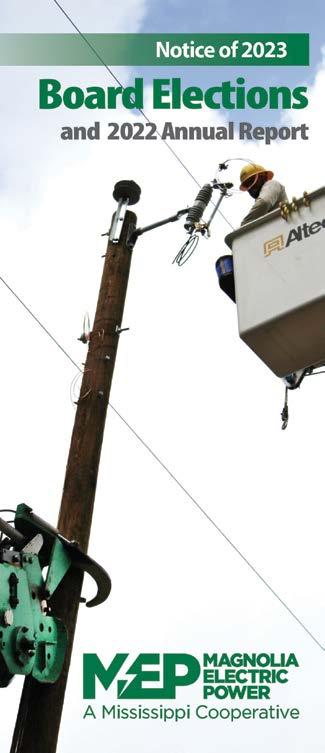
“We appreciate everyone’s patience during this di cult time. We have kept the power on through some quite trying times since the Covid outbreaks have reached Mississippi including tornadoes, ice storms, and hurricanes,” Smith said.
“I ask that our members look for the proxies that will be dropped in the mail in early February and be a part of our election process by sending in your proxies,” Smith concluded. “It is very important that our members take part in our election process.”
by Darrell Smith









Covid, and now the flu and RSV, have changed a lot of things, and MEP has adjusted accordingly so that we have been able to continue our service of providing safe, reliable electric power to our members.













As we have for the past two years, we celebrated our employees’ Service Awards with a walk-through event. Although not everyone was photographed, this photo represents those who were celebrating their work milestones this past year.
If you look around your home, you likely have more devices and equipment that require electricity than ever before. Our connected lives are increasingly dependent on more electricity to function. At the same time, as demand for electricity rises, Magnolia Electric must deliver an uninterrupted 24/7 power supply — regardless of market conditions or other circumstances.
As you would expect based on your family’s habits, electricity use fluctuates throughout the day based on consumer demand. Magnolia Electric must be able to provide enough electricity to meet the energy needs of all members during times of highest energy use or “peak hours.” These peak times are typically in the morning as people start their day and in the evening as people return to their homes.

What you may not know is that electric utilities including Magnolia typically pay more for electricity — either from a power plant or from another utility with excess power — during those morning and evening “energy rush hours.” In addition, the demand for electricity is even higher when it’s especially cold outside, when heating systems must run longer to warm our homes.
If the “peak times” concept is a bit puzzling, here’s an easy way to think about it, and it’s similar to a major concert. We know costs go up when there is strong demand for tickets (or electricity), and both are subject to the basic economic laws of supply and demand. When a lot of people want the same thing, it’s more expensive. When they don’t, it’s cheaper — like a bargain matinee or an “early bird” special at a restaurant.


During peak periods when the cost to produce and purchase power is higher, we encourage you to take simple steps to save energy, such as turning your thermostat down a few notches, turning o unnecessary lights, and waiting to use large appliances during o -peak times.

You can also save energy by plugging electronics and equipment such as computers, printers, and TVs into a power strip, then turn it o at the switch during peak hours. If you have a programmable thermostat, adjust the settings to sync up with o -peak rate periods. When we all work together to reduce energy use during periods of high electricity demand, we can relieve pressure on the grid and save a little money along the way.
Another benefit of this time-of-use approach to electricity use allows greater control over your bill. Reducing the peak impacts the powersupply cost to every co-op member. This is particularly noticeable as energy costs have risen across the U.S. Collectively, everyone conserving energy and making small changes can truly make a di erence.
Remember, taking simple steps to save energy throughout the day and shifting energy intensive chores to o -peak hours is a smart choice for you and our community.
 General Manager Darrell Smith (far left) stands with those receiving their Annual Service Awards this year. They are (starting with second from left) Stacy McCaskill, 35 years; David Rachel, 15 years, Mary Lee Moak, 10 years, Janice Thomas, five years, Ronnie Temple, 30 years, Lucy Shell, 20 years, and Terry Jackson, 25 years.
Not pictured: Hollis Alford, 45 years; John McCabe, 35 years, Dennis Reeves and Paul Wilson, both 30 years, and Dennis Wilson, 20 years.
General Manager Darrell Smith (far left) stands with those receiving their Annual Service Awards this year. They are (starting with second from left) Stacy McCaskill, 35 years; David Rachel, 15 years, Mary Lee Moak, 10 years, Janice Thomas, five years, Ronnie Temple, 30 years, Lucy Shell, 20 years, and Terry Jackson, 25 years.
Not pictured: Hollis Alford, 45 years; John McCabe, 35 years, Dennis Reeves and Paul Wilson, both 30 years, and Dennis Wilson, 20 years.



District 9 MEP Board of Director Bruce McCa ery, 76, passed away Jan. 2, 2023, in Tylertown, MS.





A memorial service was held Saturday, Jan. 7, 2023, at Centerville Baptist Church, in Lexie.
James Bruce McCa ery was born on Aug. 26, 1946, in Tylertown to James Albert McCa rey and Clara Belle Wood McCa rey.
He lived in the Midway community of Walthall County and was retired from both Sanderson Farms and as a dairy farmer. He had been married 55 years to Barbara Richmond McCa ery.
He was a longtime member of Centerville Baptist Church in Lexie where he served as a deacon for many years and as the Adult Men’s Sunday School teacher. In the past, he also served as a volunteer firefighter.
He was a hard-working man who was always willing to help others. Mr. McCa ery enjoyed fishing, hunting, and spending time with his family.
In addition, he served as a MEP Board of Director for 32 years, from 1990 until his passing. He was serving as an NRECA Credential Cooperative Director on Magnolia Electric Power’s Board of Directors at the time of his passing.
Magnolia Electric Power Board President Hollis Alford said, “Bruce was a happy person, really. My wife Katie taught him in the third grade. She has more than once told me Bruce was always smiling and or laughing. I will always remember him that way.”

“Bruce McCa ery was not only an excellent director to work for, but he was also my good friend. He loved Magnolia Electric and was always looking for ways to help our members. I will truly miss Bruce’s presence on our board,” said General Manager Darrell Smith.
He is survived by his wife, Barbara Ann Richmond McCa ery; daughters, Pennelope Ann McCa ery Cassell (Donald), Leah Page McCa ery, and Pamela Renee Buchannan (Steve); grandchildren, Carol Ann Cassell Ashton (Andrew), James Garrett McCa ery, Gabe Wood and Raven Sierra Reid; brother, Je rey McCa rey; sister, Anita Diane McCa rey; and great-grandchildren Mia Skye McCa ery and Evan Lee Ashton.

Conserving water at home can result in several downstream benefits and savings. Being mindful of home water use helps preserve the amount of water in our local reservoirs and reduces costs associated with water and wastewater treatment, including the cost of delivering it to the home (for those using a public water service).

Leaky toilets, showerheads, and dripping faucets can waste up to 2,700 gallons of water annually. Home water conservation can simply start by checking your house for any leaks and drips. Another simple way to conserve water is to limit running water when it isn’t necessary. For example, turn o the faucet while brushing your teeth, and defrost food in the refrigerator or in the microwave instead of placing frozen food under running water.

Home gardens are another potential area for water conservation. Thoughtful planning can transform your home garden from a water drain to a water-e cient oasis.
Start by planting drought-resistant plants or those with minimal water needs. Group the plants by similar water needs to avoid waste by watering from plant-to-plant. Additionally, a drip irrigation system for plants that require more water can boost e ciency by using less water over a longer period. Alternatively, set lawn sprinklers on a timer to limit water use and place them where the water will only reach plants, not pavement.
Another conservation option is to use a rain barrel to collect water for non-potable purposes. Harvested rainwater is an excellent option for watering ornate gardens and washing cars.
Another option for collecting water for the garden is to collect cold water that runs while you’re waiting on the water to heat. Every drop of running water you can utilize helps.



Reducing water use at home can also help lower your energy use. The Department of Energy estimates that water heating accounts for about 20% of a home’s energy bill. Switching to an energy e cient heat pump water heater can save considerable money on electric bills. Heat pump water heaters have higher upfront costs than storage tank models, but tax incentives and potential rebates can o set this cost.
If upgrading your water heater isn’t an option, there are small changes you can make to increase water heating e ciency. Reduce hot water use by switching to low-flow faucets and showerheads. You can also turn down the water heater thermostat to 120 degrees and insulate hot water lines to increase energy savings.



Additional ways to conserve both water and electricity in the home include upgrading clothes washers and dishwashers to newer, more energy e cient models. Running these appliances only when full or selecting a “light wash” setting reduces water and electricity use. Washing dishes by hand uses more water than an energy e cient dishwasher, so avoid this method when possible.

If your home uses well water, it’s important to be mindful of water conservation, particularly in drier climates. Well pumps run on electricity and can be a source of higher energy bills. Dry, over pumped wells can cause the pump to run continuously, using excess energy in the process. Malfunctioning well pumps also lead to spikes in energy use. Regular maintenance can help identify problems, such as leaks and faulty intake, which can lead to increased use of both water and electricity.
As you can see, there are a variety of changes — some large, some small — that can help you conserve water at home. Regardless of how you do it, thoughtfully managing water use can protect our water supply and make significant changes on energy bills.
 Turning o the tap while brushing teeth can save up to four gallons of water per minute, or up to 200 gallons a week for a family of four.
Turning o the tap while brushing teeth can save up to four gallons of water per minute, or up to 200 gallons a week for a family of four.
As you can see, there are a variety of changes — some large, some small — that can help you conserve water at home.Harvested rainwater is an excellent option for watering ornate gardens and washing cars.
If you look around your home, you likely have more devices and equipment that require electricity than ever before. Our connected lives are increasingly dependent on more electricity to function. At the same time, as demand for electricity rises, Monroe County Electric must deliver an uninterrupted 24/7 power supply — regardless of market conditions or other circumstances.
As you would expect based on your family’s habits, electricity use fluctuates throughout the day based on consumer demand. Monroe County Electric must be able to provide enough electricity to meet the energy needs of all members during times of highest energy use or “peak hours.” These peak times are typically in the morning as people start their day and in the evening as people return to their homes.
What you may not know is that electric utilities including Monroe County typically pay more for electricity — either from a power plant or from another utility with excess power — during those morning and evening “energy rush hours.” In addition, the demand for electricity is even higher when it’s especially cold outside, when heating systems must run longer to warm our homes.






If the “peak times” concept is a bit puzzling, here’s an easy way to think about it, and it’s similar to a major concert. We know costs go up when there is strong demand for tickets (or electricity), and both are subject to the basic economic laws of supply and demand. When a lot of people want the same thing, it’s more expensive. When they don’t, it’s cheaper — like a bargain matinee or an “early bird” special at a restaurant.

During peak periods when the cost to produce and purchase power is higher, we encourage you to take simple steps to save energy, such as turning your thermostat down a few notches, turning o unnecessary lights, and waiting to use large appliances during o -peak times.
You can also save energy by plugging electronics and equipment such as computers, printers, and TVs into a power strip, then turn it o at the switch during peak hours. If you have a programmable thermostat, adjust the settings to sync up with o -peak rate periods. When we all work together to reduce energy use during periods of high electricity demand, we can relieve pressure on the grid and save a little money along the way.
Another benefit of this timeof-use approach to electricity use







Another benefit of this timeof-use approach to electricity use allows greater control over your bill. Reducing the peak impacts the power-supply cost to every co-op member. This is particularly noticeable as energy costs have risen across the U.S. Collectively, everyone conserving energy and making small changes can truly make a di erence.

Remember, taking simple steps to save energy throughout the day and shifting energy intensive chores to o -peak hours is a smart choice for you and our community.


Conserving water at home can result in several downstream benefits and savings. Being mindful of home water use helps preserve the amount of water in our local reservoirs and reduces costs associated with water and wastewater treatment, including the cost of delivering it to the home (for those using a public water service).






Leaky toilets, showerheads, and dripping faucets can waste up to 2,700 gallons of water annually. Home water conservation can simply start by checking your house for any leaks and drips. Another simple way to conserve water is to limit running water when it isn’t necessary. For example, turn o the faucet while brushing your teeth, and defrost food in the refrigerator or in the microwave instead of placing frozen food under running water.



Home gardens are another potential area for water conservation. Thoughtful planning can transform your home garden from a water drain to a water-efficient oasis.
Start by planting drought-resistant plants or those with minimal water needs. Group the plants by similar water needs to avoid waste by watering from plant-to-plant. Additionally, a drip irrigation system for plants that require more water can boost e ciency by using less water over a longer period. Alternatively, set lawn sprinklers on a timer to limit water use and place them where the water will only reach plants, not pavement.
Another conservation option is to use a rain barrel to collect water for non-potable purposes. Harvested rainwater is an excellent option for watering ornate gardens and washing cars.

Another option for collecting water for the garden is to collect cold water that runs while you’re waiting on the water to heat. Every drop of running water you can utilize helps.




Reducing water use at home can also help lower your energy use. The Department of Energy estimates that water heating accounts for about 20% of a home’s energy bill. Switching to an energy e cient heat pump water heater can save considerable money on electric bills. Heat pump water heaters have higher upfront costs than storage tank models, but tax incentives and potential rebates can o set this cost. Check with your local electric cooperative to see if they o er rebates or a load management program.

If upgrading your water heater isn’t an option, there are small changes you can make to increase water heating e ciency. Reduce hot water use by switching to low-flow faucets and showerheads. You can also turn down the water heater thermostat to 120 degrees and insulate hot water lines to increase energy savings.
Additional ways to conserve both water and electricity in the home include upgrading clothes washers and dishwashers to newer, more energy e cient models. Running these appliances only when full or selecting a “light wash” setting reduces water and electricity use. Washing dishes by hand uses more water than an energy e cient dishwasher, so avoid this method when possible.
If your home uses well water, it’s important to be mindful of water conservation, particularly in drier climates. Well pumps run on electricity and can be a source of higher energy bills. Dry, over pumped wells can cause the pump to run continuously, using excess energy in the process. Malfunctioning well pumps also lead to spikes in energy use. Regular maintenance can help identify problems, such as leaks and faulty intake, which can lead to increased use of both water and electricity.
As you can see, there are a variety of changes — some large, some small — that can help you conserve water at home. Regardless of how you do it, thoughtfully managing water use can protect our water supply and make significant changes on energy bills.

As you can see, there are a variety of changes — some large, some small — that can help you conserve water at home.









Because motors and pumps account for a significant amount of energy use on a farm, replacing ine cient motors with e cient models can save energy and reduce costs. Adding variable frequency drives (VFDs) allow you to vary the frequency and voltage supplied to the motor or pump to adjust the motor’s speed. This saves kilowatt hours and reduces load by only operating at the needed capacity. VFDs can be used in place of a phase converter, which allows use of three-phase power equipment where there is only access to single-phase power.
The importance of farms cannot be understated. Farmers feed our families and keep the country running, but the business brings many challenges, including risk and uncertainty. Finding ways to use less energy can reduce costs and result in energy savings for years to come.
The longer lights are on, the higher the potential for savings. Prioritize replacing incandescent or fluorescent exterior lighting on photocells or lights that stay on all night. LED lights last two to four times longer than fluorescents and 25 to 35 times longer than incandescents. That means less frequent replacement, which saves on materials and labor costs.
In climates where engine block heaters are used to keep vehicle engines warm enough to start, adding engine block heater controls with temperature sensors and timers will reduce electricity use. To keep water from freezing on farms with livestock, save energy by using stock tank heaters with thermostatic controls, which operate only when needed instead of running constantly. Insulated stock tanks may eliminate the need to heat water.
New farming technologies that o er e ciency possibilities include electric tractors, space heating and water heating. Equipment with information technology capabilities can aid e ciency by monitoring conditions and automating farming tasks. As with home e ciency practices, consider the equipment used most and the savings potential from upgrading or modifying existing equipment.


Upgrade irrigation equipment to use less water, which means less pumping and reducing the amount of water and energy consumed. The goal is to get the right amount of water where it is needed. This can be accomplished by reducing evaporation through system design and fixing leaks in the system. GPS and geographic information system technologies allow for more specific irrigation targeting. Monitor and test systems regularly to ensure maximum e ciency.
About 80% of U.S. farms are located in counties served by electric cooperatives. Check with your local electric co-op to see if they o er rebates on farming equipment and energy-e ciency projects that help reduce energy use. Improving e ciency on the farm can result in less energy use, lower bills and improved farming success during challenging financial times.
Miranda Boutelle is the vice president of operations and customer engagement at E ciency Services Group in Oregon, a cooperatively owned energy e ciency company.



A Black Swan Event is one that comes as a complete surprise and has a major e ect. Having never experienced an event such as this, I invented the term “Grey Swan Event,” only to see it had already been coined. Nonetheless, we have seen Grey Swan Events as of late. These are events which are known and possibly could happen, even though not likely.
We never truly thought we would see a time when transformers, vehicles, and other equipment would require an advance order of 16 to 18 months. Recent U.S. Department of Energy requirements regarding increased e ciencies will make steel for certain equipment even more di cult to obtain as raw materials for these products, further increasing delivery times. These products are critical to the utility industry.
Vandalism has discovered utility infrastructure in the U.S. recently. This illegal activity jeopardizes electric service for tens of thousands of electric consumers. Coupled with supply constraints we already face, damages resulting from destruction of critical equipment could take an indefinite amount of time to repair and jeopardize the lives of those participating in such activity.
Did our community ever truly think we would see rolling blackouts from our energy providers? We thought these conditions were limited to third-world nations. Extreme cold found the weak spots in the Tennessee Valley Authority’s (TVA) generation system in late December. When driving north winds found unprotected areas of TVA’s fossil fleet, the un-operable generators were unable to deliver the over 30,000 MW of power required to keep the system stable. After receiving reasonable assurances the system was in good shape


the night before, Northcentral was informed by TVA of generation issues early the next morning, carrying us through five levels of energy curtailment in one hour. Rolling blackouts were utilized on two occasions over the next 24 hours to keep the distribution and transmission grid operable. Your cooperative covered all the bases regarding hardening and maintain our system, but if the generation/ transmission system is unable to meet our needs, we must take those steps required to ensure we don’t lose our entire system for a lengthy period of time. You’ll be hearing more on this topic in the future.
Let’s not forget labor shortages, air travel issues, and the fact that several large cities have experienced long periods without drinking water.
These are events we all knew were possible, but few thought were probable. We must, as a society, work to identify the root causes of the issues and correct them. Occurrences of this nature have happened in the distant past, but we never thought we would see them in 2023. Shortages in critical materials, water, and electricity is in no way acceptable. If you are being led to think this is a future norm, we at Northcentral pledge to you that it will not be.
We will have more information next month.
Stay safe.
by Kevin Doddridge General Manager/CEO










Northcentral has named 13 high school juniors to participate in the Cooperative Youth Leaders program.
Established in 1986 by the Electric Cooperatives of Mississippi and sponsored by Northcentral Electric, the program provides an opportunity for students to learn about electric cooperatives and the impact they have on communities.
The program is also designed to have students grow in leadership qualities through team building exercises and to expand their communication skills, confidence, and courage in decision making.
Finally, the program allows the students to experience the democratic process at the state and federal levels by visiting the state and U.S. capital cities – Jackson and Washington, D.C.




Students are selected by first entering an essay contest, then attend interviews conducted by a committee on behalf of Northcentral.

Northcentral’s 13 program students will attend The Cooperative Leaders Workshop from March 1 to March 3 in Jackson. The three-day workshop features a true cooperative learning atmosphere including a visit to the State Capitol, breakfast with their state lawmakers, and visits from motivational speakers.
The students will head to Washington, D.C. for the program’s Youth Tour which starts June 18 and ends June 23.
The tour includes visits to monuments and memorials, a tour of Arlington National Cemetery, a major league baseball game, and a leadership conference with students from other states.


























 Megan Brewer MARSHALL ACADEMY Taylor Burkes DESOTO CENTRAL HIGH SCHOOL (Career Technical Center)
DeAnthony Clayborn OLIVE BRANCH HIGH SCHOOL
Callie Curran OLIVE BRANCH HIGH SCHOOL (Career Technical Center)
Cory Johnson, Jr. LEWISBURG HIGH SCHOOL
Walker Jones LEWISBURG HIGH SCHOOL
Miranda Martin OLIVE BRANCH HIGH SCHOOL
Caleb McCain LEWISBURG HIGH SCHOOL
Cooper Medlin CENTER HILL HIGH SCHOOL
Tyler Shelley DESOTO CENTRAL HIGH SCHOOL
Kyleigh Steele NORTHPOINT CHRISTIAN SCHOOL
Blake Stewart CENTER HILL HIGH SCHOOL
Megan Brewer MARSHALL ACADEMY Taylor Burkes DESOTO CENTRAL HIGH SCHOOL (Career Technical Center)
DeAnthony Clayborn OLIVE BRANCH HIGH SCHOOL
Callie Curran OLIVE BRANCH HIGH SCHOOL (Career Technical Center)
Cory Johnson, Jr. LEWISBURG HIGH SCHOOL
Walker Jones LEWISBURG HIGH SCHOOL
Miranda Martin OLIVE BRANCH HIGH SCHOOL
Caleb McCain LEWISBURG HIGH SCHOOL
Cooper Medlin CENTER HILL HIGH SCHOOL
Tyler Shelley DESOTO CENTRAL HIGH SCHOOL
Kyleigh Steele NORTHPOINT CHRISTIAN SCHOOL
Blake Stewart CENTER HILL HIGH SCHOOL

Northcentral recently celebrated employees that reached milestone service anniversaries in 2022.

10 YEARS
Tammy Bunn
JD Cox
Lauren Presley

20 YEARS
Joel Barrett
Leah Grant
Cli Lauderdale
Charles Wheeler
25 YEARS
Donald Pogue
35 YEARS
Kevin Doddridge
Barry Williams
LOW TREE ZONE
Avoid planting within 20 ft. of power lines. If planting is unavoidable, only plant shrubs and small trees that reach a mature height of 15 ft. or less.
MEDIUM TREE ZONE

Plant medium trees (under 40 ft. when mature) at least 25 ft. away from power lines.
LARGE TREE ZONE
Plant large trees (over 40 ft. when mature) at least 50 ft. away from power lines.
Before you dig, call 811 to locate buried utility lines.









Whether you have been out to eat, bought groceries, or done a home renovation, it seems that the price of everything has risen. This has put a strain on everyone’s pocketbooks during a time when our budgets are already stretched thin. Those same fears you encounter have also been a reality for not-for-profit electric cooperatives like Pearl River Valley Electric. In the last three years, we have seen huge price increases and supply chain issues due to the COVID-19 pandemic and global financial instability. However, we are working to combat these irregularities by being proactive.
As of December 2022, the time this article was written, the inflation rate was 7.1%. While this is high, this number doesn’t provide the whole picture for increased costs. When we look at feeding our families, the expense of individual items has skyrocketed. For example, eggs have increased around 43%, milk 14.5%, and bread 14.8%. In total, eating at home has risen approximately 12.4%. This isn’t the only area of our lives impacted. The cost of motor vehicle maintenance and repair has risen 10.3%, health insurance rose 20.6%, and airline fares have reached 42.9%. These increases can be overwhelming for any family.
In our own industry, the increases have been extremely high across the board for essential materials used to maintain a reliable electric system. Our most visible pieces of equipment, our poles and transformers, have increased 44% and 8% respectively in the last year. However, these are only a small portion of the equipment we use. In order to maintain an electric system that is safe, e cient, and reliable, Pearl River Valley Electric must keep a supply of basic
equipment in stock. These include anchors, lightning arrestors, guy wire, conduit, conductor, hot line clamps, and insulators. All of these have increased dramatically (see chart).
While last year’s price increases have been di cult, what is even more staggering is the upsurges we have seen over the last three years since the COVID-19 pandemic started. Amazingly, standard materials such as conductor, used for our electrical lines, have increased from 64% to 148%, depending on the type. PVC conduit, which we use to protect underground electrical wiring, has increased a shocking 357% since 2020. While it is impossible to ignore these price increases, we are constantly searching for cost e ective ways to replenish our stockpiles by looking at various companies and distributors across the U.S. to get the best price.

Another issue we are facing that plays a role in surging costs is supply restraints. The lack of materials available to all electric utilities has increased pricing and forced us to work harder to find solutions to a lack of resources. In some cases, wait times for materials stretch out to almost a year. Your Pearl River Valley Electric purchasing department is constantly searching for materials, at the best price possible, to help us keep your electric service operating at the same reliability you’ve come to enjoy.
It’s hard to predict going forward how inflation and pricing will impact our cost of doing business in the future, but you have our personal assurance that we will do everything to keep costs as low as possible. Thank you for being a member of Pearl River Valley Electric, and we look forward to being your power provider in the future.











Winter in Mississippi can be a mixed bag of summer-like temperatures, harsh, bitter cold, and everything in between. During mild winters, our members can often see cost savings on their power bills, however during extended cold snaps, electric use skyrockets and bills can increase dramatically.


During intense cold in the winter and severe heat in the summer, bills typically rise because temperatures and weather are the biggest influence on power bills. In addition, your heating and cooling system is your home’s biggest user of electricity. These two factors account for higher electric bills during extreme high/ low temperature events. A prime example of this was during last December’s Winter Storm Elliot. During Elliot we saw record breaking cold including several days where temperatures were below 20 degrees. During this period, if you were trying to keep your home at 65 degrees, there was an over 40-degree di erence between your inside air and the frigid outside air. In a situation like this, your heating system worked non-stop to keep the air in your home at your desired temperature. On top of this, strong winds brought the “feels like” temperature down to the single digits. The wind helped the cold air infiltrate your home, making it even harder for your heating system to maintain your desired temperature.


Increased electric use wasn’t the only result of Winter Storm Elliot. The storm not only impacted Mississippi, but the majority of the U.S. Cold temperatures and blizzard like conditions caused higher than normal electric use, which put a strain on the electric grid. Unfortunately, this forced many to experience controlled temporary outages, including northern Mississippi.
Our electric grid is interconnected and when a storm such as Elliott a ects a large area of our country the grid can become strained. In extreme conditions such as this, you may be asked to minimize your electric use. This may include lowering your thermostat or putting o laundry to ensure the grid remains reliable. However, if this doesn’t alleviate the strain on the power grid, controlled temporary power outages may occur.
Controlled temporary power outages are implemented only when necessary, and only for specified periods of time to prevent longer, more widespread outages. In our case, Cooperative Energy, our power provider, would require its member systems to cut electric use. In a situation like this, PRVEPA may not have time to notify its members of where or when the power outages may occur. Because of this, it is recommended that our members who rely on medical devices prepare by having a plan in place in case of extended outages. Ideally, when these outages occur, they will be short, and we will make every attempt to alert our members of what is going on.
While we can’t control the weather, the good news is that there are several lowcost steps you can take to help make your home more energy e cient during these periods. First, purchase some low-cost caulk and weather-stripping. These can be used to seal around windows and doors to stop air from infiltrating. During the winter, set your furnace at 68 degrees or lower. Three to 5% more energy is used by each degree you set your furnace above 68 degrees. Lastly, make sure to have your heating and cooling system’s air filter changed every 30 days to prevent build-up of debris on the filter. While this won’t eliminate higher electric use during severe cold and heat, it will save you money during other periods of the year.

Please visit www.prvepa.com for more information on energy e ciency.


You can now pay your Pearl River Valley Electric bill by text anytime, from anywhere with your smartphone (or your old flip phone).
STEP 1 • If you aren’t already enrolled in text alerts, simply text “JOIN” to #352667.
STEP 2 • When you receive your welcome text, choose “START.”
STEP 3 • If you haven’t done so, set up a payment profile in our member portal through our website PRVEPA.com or through our app.
Once you are enrolled in text alerts you can receive account and payment information with easy-to-use commands.
Text “BAL” to receive your account balance. You will then be asked to choose your account or accounts.
Text “PAY” to make a payment. You will then be asked to choose your account or accounts.
Text “CALL” to make a call to our o ce. Other options available include “HELP,” “MENU,” “RESET” and “STOP”, which opts you out of text alerts.
Pearl River Valley Electric has made it easier than ever to pay your bill without the hassle of writing a check or leaving your home. Please check out these options to make paying your bill simple.
Bank Draft or Credit/Debit Draft • When it comes time to pay your bill, why waste the time to write a check? Relax knowing that your bill is automatically being paid from your account. Pearl River’s bank draft and debit/credit card draft programs are easy and convenient. Please visit our help center at www.prvepa.com to fill out these forms.
PRVEPA App • Pearl River Valley Electric members can access their account information from their smart devices. You can pay your bill, track daily electric use and view your billing history. You can also set up alerts for when your bill is due. Apps for Apple and Android devices are available. Simply visit your app store and search for “PRVEPA.” It’s free, convenient, and easy to use.
Website • Just like our app, paying through Pearl River Valley Electric’s website is e ortless. Go to www.prvepa.com and create a user ID in our customer service portal to access bill pay, electric use data, billing history, and more!

E-Bill • Through our PRVEPA customer service portal you can sign up for e-billing to receive paperless statements directly to your email. It’s friendly to the environment, convenient, and secure.

Applications are available at PRVEPA o ces and at www.prvepa.com. Completed applications must be postmarked or emailed by August 11. Scholarship recipients must be a PRVEPA member, spouse or child of a member participating in the Round Up program.
Recipients must be full time (12 hours or more per semester) freshmen students enrolled in academic or career-technical programs.
• Scholarship funds will be credited to each student’s college account — no checks will be issued to individuals.

• Scholarships should be awarded by the end of September. Students must be enrolled in good standing at the time funds are released to the colleges.




Recently, Pearl River Valley Electric teamed up with the Southern Mississippi Planning and Development District to put a smile on the faces of seniors in Stone and Marion counties at Christmas time. Employees from each of our o ces donated toboggans, socks, and blankets to be handed out to area seniors.




“Our employees really care about improving the quality of life in the communities we serve,” said Anthony Harris, manager of economic development and community relations. “By donating these items, we helped so many of our elderly members this last Christmas season.”
PRVEPA’s employees collected enough items across its districts to make 130 gift packets that were delivered to seniors.





Because motors and pumps account for a significant amount of energy use on a farm, replacing ine cient motors with e cient models can save energy and reduce costs. Adding variable frequency drives (VFDs) allow you to vary the frequency and voltage supplied to the motor or pump to adjust the motor’s speed. This saves kilowatt hours and reduces load by only operating at the needed capacity. VFDs can be used in place of a phase converter, which allows use of three-phase power equipment where there is only access to single-phase power.
The importance of farms cannot be understated. Farmers feed our families and keep the country running, but the business brings many challenges, including risk and uncertainty. Finding ways to use less energy can reduce costs and result in energy savings for years to come.

The longer lights are on, the higher the potential for savings. Prioritize replacing incandescent or fluorescent exterior lighting on photocells or lights that stay on all night. LED lights last two to four times longer than fluorescents and 25 to 35 times longer than incandescents. That means less frequent replacement, which saves on materials and labor costs.

In climates where engine block heaters are used to keep vehicle engines warm enough to start, adding engine block heater controls with temperature sensors and timers will reduce electricity use. To keep water from freezing on farms with livestock, save energy by using stock tank heaters with thermostatic controls, which operate only when needed instead of running constantly. Insulated stock tanks may eliminate the need to heat water.



New farming technologies that o er e ciency possibilities include electric tractors, space heating and water heating. Equipment with information technology capabilities can aid e ciency by monitoring conditions and automating farming tasks. As with home e ciency practices, consider the equipment used most and the savings potential from upgrading or modifying existing equipment.







Upgrade irrigation equipment to use less water, which means less pumping and reducing the amount of water and energy consumed. The goal is to get the right amount of water where it is needed. This can be accomplished by reducing evaporation through system design and fixing leaks in the system. GPS and geographic information system technologies allow for more specific irrigation targeting. Monitor and test systems regularly to ensure maximum e ciency.
About 80% of U.S. farms are located in counties served by electric cooperatives. Check with your local electric co-op to see if they o er rebates on farming equipment and energy-e ciency projects that help reduce energy use. Improving e ciency on the farm can result in less energy use, lower bills and improved farming success during challenging financial times.
Conserving water at home can result in several downstream benefits and savings. Being mindful of home water use helps preserve the amount of water in our local reservoirs and reduces costs associated with water and wastewater treatment, including the cost of delivering it to the home (for those using a public water service).



Leaky toilets, showerheads, and dripping faucets can waste up to 2,700 gallons of water annually. Home water conservation can simply start by checking your house for any leaks and drips. Another simple way to conserve water is to limit running water when it isn’t necessary. For example, turn o the faucet while brushing your teeth, and defrost food in the refrigerator or in the microwave instead of placing frozen food under running water.





Home gardens are another potential area for water conservation. Thoughtful planning can transform your home garden from a water drain to a water-efficient oasis.
Start by planting drought-resistant plants or those with minimal water needs. Group the plants by similar water needs to avoid waste by watering from plant-to-plant. Additionally, a drip irrigation system for plants that require more water can boost e ciency by using less water over a longer period. Alternatively, set lawn sprinklers on a timer to limit water use and place them where the water will only reach plants, not pavement.
Another conservation option is to use a rain barrel to collect water for non-potable purposes. Harvested rainwater is an excellent option for watering ornate gardens and washing cars.


Another option for collecting water for the garden is to collect cold water that runs while you’re waiting on the water to heat. Every drop of running water you can utilize helps.




Reducing water use at home can also help lower your energy use. The Department of Energy estimates that water heating accounts for about 20% of a home’s energy bill. Switching to an energy e cient heat pump water heater can save considerable money on electric bills. Heat pump water heaters have higher upfront costs than storage tank models, but tax incentives and potential rebates can o set this cost. Check with your local electric cooperative to see if they o er rebates or a load management program. Check with your local electric cooperative to see if they o er rebates

If upgrading your water heater isn’t an option, there are small changes you can make to increase water heating e ciency. Reduce hot water use by switching to low-flow faucets and showerheads. You can also turn down the water heater thermostat to 120 degrees and insulate hot water lines to increase energy savings.



Additional ways to conserve both water and electricity in the home include upgrading clothes washers and dishwashers to newer, more energy e cient models. Running these appliances only when full or selecting a “light wash” setting reduces water and electricity use. Washing dishes by hand uses more water than an energy e cient dishwasher, so avoid this method when possible.
If your home uses well water, it’s important to be mindful of water conservation, particularly in drier climates. Well pumps run on electricity and can be a source of higher energy bills. Dry, over pumped wells can cause the pump to run continuously, using excess energy in the process. Malfunctioning well pumps also lead to spikes in energy use. Regular maintenance can help identify problems, such as leaks and faulty intake, which can lead to increased use of both water and electricity.
As you can see, there are a variety of changes — some large, some small — that can help you conserve water at home. Regardless of how you do it, thoughtfully managing water use can protect our water supply and make significant changes on energy bills.


As you can see, there are a variety of changes — some large, some small — that can help you conserve water at home.Leaky toilets, showerheads, and dripping faucets can waste up to 2,700 gallons of water annually.
Karen Laprade, PEPA Plant Accounting Clerk
INGREDIENTS
1 can crescent rolls
2 cups water, divided
2 cups sugar
2 sticks butter
8 sweet potato patties
2 tbsp all-purpose flour
1 tbsp vanilla cinnamon to taste
Sue Cook, PEPA Retiree
INGREDIENTS
1 ½ lbs. ground beef
2 cans pinto beans, partially drained picante or taco sauce
lettuce, tomato, onion, cheese
Cut rolls into 16 strips. Cut sweet potato patties in half. Roll crescent rolls around the potatoes and place in a greased 9” x 13” dish. Combine half of the water and flour and bring to boil. Add rest of water, sugar, and butter until slightly thick. Add vanilla and pour over crescent rolls. Sprinkle with cinnamon. Bake at 350 degrees until brown. Makes 16.
Jennifer Johnson, PEPA Manager of Human Resources
INGREDIENTS
1 package Oreos, crushed into pieces
8 ounces cool whip
2 packages vanilla instant pudding
8 ounce cream cheese
2 cups milk
Mix cream cheese and milk with mixer. Pour in pudding and mix. Add cool whip and mix. Add two-thirds of the Oreos and mix. Sprinkle remainder of Oreos on top.
taco seasoning
16 ounces sour cream
2 bags of Doritos
Brown meat and drain. Add taco seasoning. Heat pinto beans and mash. Add one-fourth of sour cream. Fix salad. Crush Doritos. Mix remainder of sour cream and picante sauce (enough sauce to make the dressing pink). Layer Doritos, pinto beans, ground beef, salad, and top with sour cream mixture.
Curtis (PEPA Retiree) and Seretha Gregory
INGREDIENTS

1 lb. ground beef
1 can Hungry Jack flaky biscuits
1 onion, chopped
½ lb. Velveeta slices
1 jar pizza quick sauce
1 bell pepper, chopped
Brown ground beef, onions, and bell pepper and drain. Add pizza quick sauce. Simmer around 10 minutes. Stir often because it does stick easily. Put mixture in casserole dish. Place enough Velveeta slices on top to cover it. Separate biscuits (break them apart in the middle.) Place on top of cheese. Bake at 350 degrees for around 20 minutes or until biscuits are browned on top. Serve.





Planning for improvements and additions to Singing River Electric’s distribution system is essential for maintaining reliable electric service for our members. The planning process, led by our engineering team, begins five to six years in advance as we evaluate our existing electrical system and ensure our system is ready to handle expected load growth and increased demand during extreme temperatures. The development of a Construction Work Plan is an integral part of this process as it provides a roadmap to assure the highest level of member service. Each year our construction line crews implement the plan by safely replacing undersized lines, upgrading transformers, and building new substations.
Crews completed construction and energized the Cumbest Blu substation in Jackson County in June 2022. This substation will more than satisfy the energy needs of our members in that immediate area as well as provide back-up electricity to nearby substations in the event of an unforeseen major outage.
Singing River Electric’s engineering team is actively planning two substation relocation projects in other parts of our service area, thus providing electric energy closer to the load centers of those areas. Additionally, crews have completed more than 10 miles of line upgrades throughout our system since July 2022. In a continued e ort to assure e cient member service, our engineering team has studied and



planned for more than 21 miles of necessary line upgrades to begin later this calendar year.
Along with our Construction Work Plan, Singing River Electric must maintain an aggressive right-of-way clearing schedule to successfully fulfill our obligations to you, our members. Clearing and re-clearing the right-of-way around our power lines enhances service reliability and assures safety for our members, wildlife, and the general public. The re-clearing of trees, limbs, and underbrush along our more than 7,600 miles of power lines occurs every four to five years.
In conjunction with our ongoing fiber-tothe-home internet project, we have taken another step to improve electric service reliability to our members as our team of employees and contractors begin installing a SCADA (supervisory control and data acquisition) system. This extensive project requires the use of fiberoptic lines installed along our distribution system to provide real-time information from SRE’s 45 electric substations to our three o ces. We are in the process of training our employees on how to safely use this tool to utilize its full potential, thus avoiding potential outages and minimizing outage times for you, our members.
With careful planning and skilled employees, Singing River Electric remains committed to providing our members with the most reliable electric service at the most economical cost.
by Brian Hughey General Manager and CEOWeather often has a significant impact on power bills. On mild winter days, your heater or air conditioner may not run much at all. However when the temperature drops for an extended period of time into the 30s, 20s or teens, heating systems can run most of the day and night. This added electricity use can raise power bills dramatically.
An electric furnace is the most expensive way to heat a home. Heat pumps are the most e cient, as they draw heat from the air outside to heat the air inside of your home or business. Heat pumps work best in at least 40-degree temperatures. Higher performing heat pumps can still perform well in temps below freezing. Because our region tends to stay mild, even in the winter, heat pumps work best in both e ciency and function. The exception is when you have several days of extreme cold. On this rare occasion, the heat pump must use its built-in emergency heat and operate the same as an electric furnace. That is why even if you never touched the thermostat on these days, your heating unit is working harder and longer and using more electricity, and your electric bill will be higher due to the increased kilowatt-hours used. For more information on seasonal energy use or a link to our online energy audits, visit singingriver.com.
Candidates seeking election to the Singing River Electric Cooperative board of directors must visit the Lucedale o ce located at 11187 Old 63 South and obtain a director qualification packet. The forms and petitions included must be completed, and the packet returned by the close of business on the last business day of February (Tuesday, Feb. 28, 2023).
Electric co-op employees complete local service acts to honor Martin Luther King, Jr.
inging River Electric joined other Mississippi electric cooperatives to participate in the Cooperative Days of Service, held annually in conjunction with Dr. Martin Luther King, Jr.’s birthday and holiday.

King stated, “Everybody can be great, because anybody can serve.” Singing River Electric employees volunteered for three days of community service. The first project involved applying water sealant to picnic tables at Leakesville’s Green Park on Main Street. Volunteers also painted bleacher seats at the Bear Creek Baseball Complex t-ball fields.
The second project had volunteers removing invasive plant species from a large area near the Pascagoula River Audubon Center’s entrance and performing other tasks around the Moss Point center and grounds.
The third group of volunteers worked in the kitchen at George County’s SREA Head Start to replace ceiling tiles, replace wiring, upgrade all kitchen fluorescent light

fixtures to LED lights, and remove laminate from the kitchen counter so it can be recovered.
“Our employees take great pride in their communities and performing service projects like these that will benefit others,” said Singing River Electric General Manager and CEO Brian Hughey. “These acts align with the cooperative principle ‘Concern for Community,’ which Singing River Electric employees keep top of mind year round.”
Singing River Electric was joined in the Co-op Days of Service annual event by Cooperative Energy, Coahoma Electric, Coast Electric, Dixie Electric, Magnolia Electric, Southern Pine Electric, and Southwest Electric. These electric cooperatives completed similar acts of service including serving at community kitchens, collecting diapers and food, removing debris from boat ramp areas, and more.
For more information on each of the service projects, visit singingriver.com or join us on our social media pages on Facebook/Instagram (SingingRiverElectric) and Twitter (SRECooperative).
Everybody can be great, because anybody can serve. –Martin Luther King, Jr.




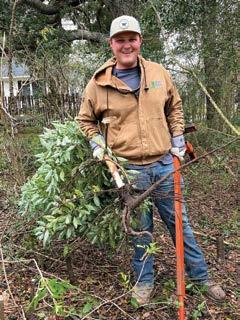


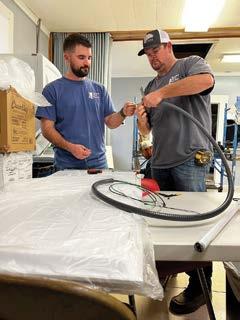

STEP 1: Make-ready engineering
Examine. Design.
STEP 2: Planning the most efficient approach to fiber deployment.

Make-ready construction

STEP 3: Building a network from the ground up.
Construction
STEP 4: Connecting the dots. Splicing
STEP 5: Preparing the neighborhood.
Service drop
STEP 6:



Drop splicing





The last outdoor step. Almost there …
STEP 7: The speed of light, right to your home.






Installation
SR Connect is delivering lightning-fast, fiber internet. Call 877-272-6611 to sign up! Scan the QR code to search your address and view full-size maps of all fiber areas.


Scan here!

We interviewed Bob White, president of the Gautier Men’s Club, to talk about the group’s annual night parade.

SRE: How long has the Gautier Men’s Club sponsored the Gautier night parade?
White: 2023 will be our 33rd year of parading at night through Gautier.
SRE: What makes the Gautier parade unique?

White: Our parade has always been a night parade, and our parade is 100% family-oriented.
SRE: What is the date and time for the 2023 parade?
White: We will roll through Gautier on Saturday, Feb. 11, at 7 p.m. You can find the parade flyer, route information, and participant application at Gautier Men’s Club on Facebook. The deadline for parade participation is Feb. 4.









What makes Southern Pine Electric and other cooperatives di erent from other companies? The cooperative business model sets us apart from other companies or utilities because we adhere to seven guiding cooperative principles. These principles reflect core values of honesty, transparency, equity, service for all, and concern for the community’s greater good.
Electric cooperatives, including Southern Pine, have a unique and storied place in our country’s history. We democratized the American dream by bringing electricity to rural areas when for-profit electric companies determined the e ort too costly. Back then, cities were electrified, and rural areas were not, creating the original rural-urban divide. Newly established electric lines helped power economic opportunity in rural areas. Today, that spirit of service for all is vital to our co-op DNA.
When Southern Pine was founded, each member contributed an equal share to gain access to electricity that benefited individual families and the larger local community. Each member had an equal vote in co-op matters. That is still how we operate today. Membership is open to everyone in our service territory, no matter who you are. By paying your $5 membership fee, the same as in 1938, you became a co-op member, and your vote is just as important as your neighbor’s.

We know members of our community have di erent needs and perspectives. We welcome diverse views on all issues under consideration by the co-op. The more viewpoints we hear, the better we can reflect all aspects of our community’s needs.



We strive to make long-term decisions that improve and enrich the communities we serve. Our top priority is providing safe, reliable, and a ordable energy. Still, we also want to be a catalyst for good in our community. Because we are your local electric cooperative, co-op revenue stays here. This allows us to invest in our communities through children and youth programs, charitable giving, community service projects, and educational programs.
While today’s world is radically di erent than when Southern Pine Electric was founded, our cooperative values have stood the test of time and remain just as relevant today.




 by Chris K. Rhodes
by Chris K. Rhodes




Southern Pine Electric held its annual Cooperative University for over 30 high school juniors, representing 19 high schools. Each student was nominated by their high school counselor based on demonstrated leadership traits.



The students learned about Southern Pine Electric, electric cooperatives, and electric safety and participated in various leadership activities. They also met with their local legislators to ask questions that are important to them. Ten students were selected to return for interviews to vie for Southern Pine’s Youth Leaders.

“Other than providing safe, reliable, and a ordable electric service, this is one of the most important things we do at Southern

Pine,” said Chris Rhodes, president, and CEO. “Investing in tomorrow’s leaders will pay dividends for our communities. Seeing these young leaders makes me feel great about those leading the way in years to come.”
A panel of outside judges chose four students to be Southern Pine’s Youth Leaders at ECM’s Cooperative Youth Leaders program. Ruby Sage Rogers of Presbyterian Christian School, Carlee Harrell of Seminary High School, Claire Hennington of Union High School, and Emma Grace Thomas of Morton High School will all attend a youth leadership workshop in Jackson in March. In June, the four young women will attend ECM’s Youth Tour of Washington, D.C.

Working safely and going home to our families at the end of a work day is our priority. We are proud of our employees for working safely and we recently awarded the employees above who have reached milestones of 30 years or more with no lost time incidents. Congratulations!

Congratulations to the dedicated employees who were recognized in December for the service to Southern Pine Electric and our members.
10 Years
Michael E Cook
15 Years
Jonathan A Walters
Shay A Sanford
David Brett Dew
Perry Jay Montgomery

Robert J Seal


Walter Shane Killebrew
Grover Rodney Ellzey
Terry L Blackwell
Clinton G Hudson
Rainey L Dickerson

20 Years
John A Prestage
25 Years
Lisa C Boone
Larry Trent Dotson





35 Years
Jamie D Arender
Willis M Jones JR

Charles H Holifield

James P Lang
J Michael Kennedy
40 Years
Suzanne R Easterling


45 Years
Jeffrey A McCallum
Jimmy C Mathis
50 Years
John G Dees


Jim and Pat Coker have been members of Southern Pine Electric for over 30 years, and many of those years have been spent making their community much sweeter. Pat’s Pies is known around Hickory and the surrounding areas for the delicious fried pies that make everyone a little bit happier. Pat learned to make sweet treats from her mother, who used to make and sell the pies to stores around Newton.

Pat started making the pies for the 5th Sunday lunches at Sand Springs Baptist Church, and they were a hit. One church deacon even recognized the pies from the taste of her mother’s years ago. He would buy a dozen pies to take with him to college during his younger years, and the taste was unmistakably the same.
She made delicious creations to give to people who needed them as time progressed. She’d take her fellow church members the pies when they were sick, or a family loss occurred. The business grew from there, and her children bought her business cards. Jim built her a pie-making house in the back of their home; the rest is history.
While Jim is a big help in many ways, he jokes that he was no help in the kitchen. “I worked for 41 years driving a forklift for ESCO and never had a day of trouble, but on my first day working for Pat’s Pies, I got fired because I wasn’t rolling the dough right,” Jim said with a smile. Pat chuckled and added, “he just couldn’t get it right, and it has to be right, so he helps in other ways.” Pat and Jim’s favorite part of the business is meeting new people from all over. Jim said they met a lady traveling from
Louisiana to Atlanta for treatment at the cancer center. After talking with her, they gave her some pies, and she just lit up with a smile. “It’s things like that. That’s why I love it,” said Pat.
Over the years, Pat has fried many pies, each one special. She said the most pies she has ever made in a week is 50 dozen. These days are a little slower for Pat and Jim. After su ering from Covid, Pat says she gets tired quickly. “We don’t make as many as we used to since I’ve gotten Covid, so we’re semi-retired. I still make the pies to take places, especially to church. Every year I take some by the Southern Pine o ce, too,” said Pat.


Jim is so proud of his wife and loves that she is carrying on her mother’s tradition of making fried pies. “It’s really a lost art form,” he said. Pat said that making the pies had been a blessing for them. One thing is sure, it’s the Hickory community that is blessed to have Pat’s Pies at the heart of it.
Between the two of them, they have four children and nine grandchildren. When they are not busy making pies, the couple participates in AKC beagle field trial competitions. They not only participate, but they win. Their mantle is covered in ribbons and trophies.
I still make the pies to take places, especially to church. Every year I take some by the Southern Pine o ce, too.
Every year, Southwest Electric works diligently to maintain its rights-of-way. With over 4,200 miles of power lines in rugged terrain, keeping the trees trimmed and away from the lines is necessary work to maintain and improve system reliability. Typically, contractors are needed to help spray herbicides, cut trees and limbs and remove debris from our lines. This work is often initiated at the substations and is cleared to the end user, which is you, the Member. This year, plans have been made to trim or spray 1,390 miles of line in the areas of Cloverdale, Crosby, Kingston, Port Gibson, Utica and Woodville, as indicated in the shaded areas of the map. Please be mindful of contract crews working in these areas over the course of the year.














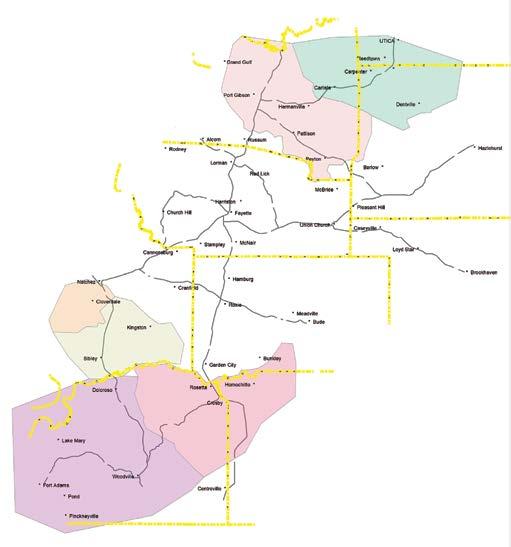
Southwest Electric is proud to join hundreds of other cooperatives around the country in o ering our own energy assistance program. Our Members Paying It Forward program enables Members to round up their bills and help support other Members over the age of 50 needing assistance to pay their electric utility bills.
Our employees and Directors are also Paying It Forward by donating to the program. To date, $17,772.14 from this program has helped 49 qualifying Members between the ages of 52 to 85.
To round up your bills and start Paying It Forward, please visit our website, email or call us.
Phone: 800-287-8564
Website: southwestelectric.coop

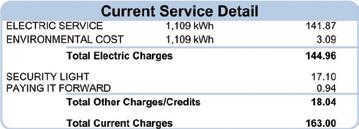


Email: memberspayingitforward@swepa.coop

AJFC Community Action Agency, Inc. ajfccaa.org
601-442-8681
Hinds County Human Resource Agency hchra.org • 601-923-3950


Southwest Mississippi Opportunity, Inc. swmocaa.org
601-888-4211
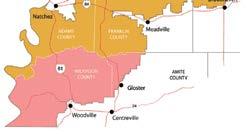
Catholic Charities catholiccharitiesjackson.org
601-442-4579

Michael joined the Southwest Electric family in August 2010 as a Lineman Trainee. In November 2018, he was the first employee to reach the First-Class Lineman level and finish the Lineman Apprenticeship Program. He was promoted to Crew Leader of the Engineering Department’s apparatus crew in January 2021. He specializes in maintaining regulators and substation equipment. Michael lives in Port Gibson.

Matt became an employee in September 2010. He has been a Dispatcher for 12 years. Dispatchers answer phone and radio calls and dispatch crews to outages and other emergencies. They maintain our Outage Management System and keep track of our trucks and equipment on the GIS map. Matt lives in Lorman.








Have you tried our FREE Residential Energy Advisor tool? Simply answer ten questions and provide details about, for instance, the size of your house and the type of insulation. The tool will provide you with an Annual Electric Cost Breakdown showing how much of your energy dollars are spent on heating, cooling, cooking and more. It’s free and only takes a few minutes to complete.



Now available to Southwest Electric Members:
Residential Energy Advisor

Conduct a Virtual Energy Assessment of your home. It takes just a few minutes to profile your home and get savings recommendations.
Energy Basics
Would you like to learn some basics about electricity and energy use? Use our resources to learn more about electricity.
Appliance Calculator
Try comparing the operating cost of a microwave or small countertop cooker to a conventional oven. You might just be surprised.
TV Calculator
How many televisions do you have? Many homes have more than one. Compare operating costs of di erent size and types of televisions.

Lighting Calculator
What would happen if you replaced all of your incandescent light bulbs in your house with LEDs. You might be surprised at how much money you could save monthly.



The National Weather Service recently confirmed that there were two EF-1 tornadoes that were reported in our service area on Dec. 14. One tornado began in Adams County with a peak wind of 105 mph. This tornado began near the intersection of Liberty and Prospect Roads, uprooting trees and downing large tree branches. It continued northeast, crossing Cranfield Road and downing additional trees. The most concentrated damage occurred along Nations Road, where a mobile home, a travel trailer and sheds were damaged. East of there, the tornado weakened and lifted before reaching Shady Creek Road.
The other tornado occurred in Je erson County. It also had an estimated peak wind of 105 mph. This tornado began east of Highway 33 in southern Je erson County, tracking northeastward near the McNair community. Several trees were snapped or uprooted as the tornado crossed Coonville and McNair roads. The tornado caused roof damage to two homes and damaged a shed as it crossed Highway 28 and lifted shortly thereafter.


On Dec. 30 in the early morning, 74 mph straight line winds downed trees and power lines in Lincoln County. The area around St. Paul Road received the most damage that resulted in five broken poles. Other areas also felt the e ect of the storm.


As soon as an outage is reported on our SmartHub app or by calling 800-287-8564, our dispatchers receive immediate notification on our Outage Management System. Dispatchers locate the outage on the GIS map and send someone to assess the damage. Once we know what happened and the equipment and materials needed to repair the damage, a crew is sent to the location to start the work. Often times, personnel have to travel to Lorman or Natchez to get the material from our warehouses. One broken pole takes an average of four hours to replace. That includes the time to remove the broken pole from the area, frame the new pole with a cross-arm and attach the insulators and other materials, place and reinforce the new pole, detangle the power lines from trees and debris, repair or roll out new lines and finally attach the lines to the top of the poles and pull them tight.
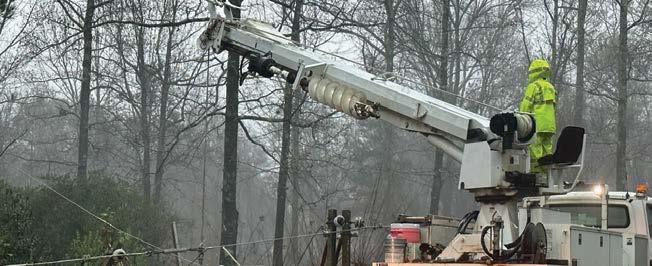
We appreciate our Members’ support, patience and understanding as we work through these natural events and restore power.Hollandale - 662-827-2262 | Belzoni - 662-247-1909 | Greenville - 662-334-9543 | Rolling Fork - 662-873-4233 twincoepa.com @twincoepa
 |
|
If you look around your home, you likely have more devices and equipment that require electricity than ever before. Our connected lives are increasingly dependent on more electricity to function. At the same time, as demand for electricity rises, Twin County Electric must deliver an uninterrupted 24/7 power supply — regardless of market conditions or other circumstances.


As you would expect based on your family’s habits, electricity use fluctuates throughout the day based on consumer demand. Twin County Electric must be able to provide enough electricity to meet the energy needs of all members during times of highest energy use or “peak hours.” These peak times are typically in the morning as people start their day and in the evening as people return to their homes.

What you may not know is that electric utilities including Twin County typically pay more for electricity — either from a power plant or from another utility with excess power — during those morning and evening “energy rush hours.”


In addition, the demand for electricity is even higher when it’s especially cold outside, when heating systems must run longer to warm our homes.

If the “peak times” concept is a bit puzzling, here’s an easy way to think about it, and it’s similar to a major concert. We know costs go up when there is strong demand for tickets (or electricity), and both are subject to the basic economic laws of supply and demand. When a lot of people want the same thing, it’s more expensive. When they don’t, it’s cheaper — like a bargain matinee or an “early bird” special at a restaurant.
During peak periods when the cost to produce and purchase power is higher, we encourage you to take simple steps to save energy, such as turning your thermostat down a few notches, turning o unnecessary lights and waiting to use large appliances during o -peak times.


 by Tim Perkins SERVING MORE THAN 12,600 ELECTRIC METERS IN SEVEN DELTA COUNTIES
by Tim Perkins SERVING MORE THAN 12,600 ELECTRIC METERS IN SEVEN DELTA COUNTIES



You can also save energy by plugging electronics and equipment such as computers, printers, and TVs into a power strip, then turn it o at the switch during peak hours. If you have a programmable thermostat, adjust the settings to sync up with o -peak rate periods. When we all work together to reduce energy use during periods of high electricity demand, we can relieve pressure on the grid and save a little money along the way.
Another benefit of this timethe






Another benefit of this timeof-use approach to electricity use allows greater control over your bill. Reducing the peak impacts the power-supply cost to every co-op member. This is particularly noticeable as energy costs have risen across the U.S. Collectively, everyone conserving energy and making small changes can truly make a di erence.

Remember, taking simple steps to save energy throughout the day and shifting energy intensive chores to o -peak hours is a smart choice for you and our community. Visit our website, twincoepa.com, for more information.

Conserving water at home can result in several downstream benefits and savings. Being mindful of home water use helps preserve the amount of water in our local reservoirs and reduces costs associated with water and wastewater treatment, including the cost of delivering it to the home (for those using a public water service).




Leaky toilets, showerheads, and dripping faucets can waste up to 2,700 gallons of water annually. Home water conservation can simply start by checking your house for any leaks and drips. Another simple way to conserve water is to limit running water when it isn’t necessary. For example, turn o the faucet while brushing your teeth, and defrost food in the refrigerator or in the microwave instead of placing frozen food under running water.



Home gardens are another potential area for water conservation. Thoughtful planning can transform your home garden from a water drain to a water-efficient oasis.
Start by planting drought-resistant plants or those with minimal water needs. Group the plants by similar water needs to avoid waste by watering from plant-to-plant. Additionally, a drip irrigation system for plants that require more water can boost e ciency by using less water over a longer period. Alternatively, set lawn sprinklers on a timer to limit water use and place them where the water will only reach plants, not pavement.
Another conservation option is to use a rain barrel to collect water for non-potable purposes. Harvested rainwater is an excellent option for watering ornate gardens and washing cars.
Another option for collecting water for the garden is to collect cold water that runs while you’re waiting on the water to heat. Every drop of running water you can utilize helps.









Reducing water use at home can also help lower your energy use. The Department of Energy estimates that water heating accounts for about 20% of a home’s energy bill. Switching to an energy e cient heat pump water heater can save considerable money on electric bills. Heat pump water heaters have higher upfront costs than storage tank models, but tax incentives and potential rebates can o set this cost. Check with your local electric cooperative to see if they o er rebates or a load management program. Check with your local electric cooperative to see if they o er rebates

If upgrading your water heater isn’t an option, there are small changes you can make to increase water heating e ciency. Reduce hot water use by switching to low-flow faucets and showerheads. You can also turn down the water heater thermostat to 120 degrees and insulate hot water lines to increase energy savings.



Additional ways to conserve both water and electricity in the home include upgrading clothes washers and dishwashers to newer, more energy e cient models. Running these appliances only when full or selecting a “light wash” setting reduces water and electricity use. Washing dishes by hand uses more water than an energy e cient dishwasher, so avoid this method when possible.
If your home uses well water, it’s important to be mindful of water conservation, particularly in drier climates. Well pumps run on electricity and can be a source of higher energy bills. Dry, over pumped wells can cause the pump to run continuously, using excess energy in the process. Malfunctioning well pumps also lead to spikes in energy use. Regular maintenance can help identify problems, such as leaks and faulty intake, which can lead to increased use of both water and electricity.
As you can see, there are a variety of changes — some large, some small — that can help you conserve water at home. Regardless of how you do it, thoughtfully managing water use can protect our water supply and make significant changes on energy bills.

 Katherine Loving writes on consumer and cooperative a airs for the National Rural Electric Cooperative Association.
Harvested rainwater is an excellent option for watering ornate gardens and washing cars.
Katherine Loving writes on consumer and cooperative a airs for the National Rural Electric Cooperative Association.
Harvested rainwater is an excellent option for watering ornate gardens and washing cars.
As you can see, there are a variety of changes — some large, some small — that can help you conserve water at home.











Because motors and pumps account for a significant amount of energy use on a farm, replacing ine cient motors with e cient models can save energy and reduce costs. Adding variable frequency drives (VFDs) allow you to vary the frequency and voltage supplied to the motor or pump to adjust the motor’s speed. This saves kilowatt hours and reduces load by only operating at the needed capacity. VFDs can be used in place of a phase converter, which allows use of three-phase power equipment where there is only access to single-phase power.
The importance of farms cannot be understated. Farmers feed our families and keep the country running, but the business brings many challenges, including risk and uncertainty. Finding ways to use less energy can reduce costs and result in energy savings for years to come.
The longer lights are on, the higher the potential for savings. Prioritize replacing incandescent or fluorescent exterior lighting on photocells or lights that stay on all night. LED lights last two to four times longer than fluorescents and 25 to 35 times longer than incandescents. That means less frequent replacement, which saves on materials and labor costs.
In climates where engine block heaters are used to keep vehicle engines warm enough to start, adding engine block heater controls with temperature sensors and timers will reduce electricity use. To keep water from freezing on farms with livestock, save energy by using stock tank heaters with thermostatic controls, which operate only when needed instead of running constantly. Insulated stock tanks may eliminate the need to heat water.
New farming technologies that o er e ciency possibilities include electric tractors, space heating and water heating. Equipment with information technology capabilities can aid e ciency by monitoring conditions and automating farming tasks. As with home e ciency practices, consider the equipment used most and the savings potential from upgrading or modifying existing equipment.

Upgrade irrigation equipment to use less water, which means less pumping and reducing the amount of water and energy consumed. The goal is to get the right amount of water where it is needed. This can be accomplished by reducing evaporation through system design and fixing leaks in the system. GPS and geographic information system technologies allow for more specific irrigation targeting. Monitor and test systems regularly to ensure maximum e ciency.
About 80% of U.S. farms are located in counties served by electric cooperatives. Check with your local electric co-op to see if they o er rebates on farming equipment and energy-e ciency projects that help reduce energy use. Improving e ciency on the farm can result in less energy use, lower bills and improved farming success during challenging financial times.
Miranda Boutelle is the vice president of operations and customer engagement at E ciency Services Group in Oregon, a cooperatively owned energy e ciency company.
Irrigation equipment can be upgraded to use less water, which means less pumping and reducing the amount of water and energy consumed. Photo Credit: Bonneville Power Administration Finding ways to use less energy can reduce costs and result in more e cient farming practices for years to come.
















































Yazoo Valley Electric Power Association is mourning the loss of Charles Moore, a member of the board of directors who passed away on Dec. 26, 2022.







Mr. Moore, who was a former chief of the Yazoo City Fire Department, spent a lifetime serving his country and his community. After serving in Vietnam with the 1st Cavalry Airmobile Division, he began a career as a firefighter in Yazoo City.
He retired as chief of the Yazoo City Fire Department in 2003 after 29 years of service. He began his career as a firefighter in Yazoo City after being hired by Chief Kenneth Woodard in 1974. After beginning as a private, he worked his way through the ranks as a lieutenant, captain, battalion chief, and assistant chief before being named chief by the Mayor and Board of Aldermen.
“I worked with and under Chief Moore for 22 years, and he was a great mentor, friend, and chief at the Yazoo City Fire Department,” said retired Yazoo City firefighter and former Fire Chief Michael Woodard.
“Charles was a good man,” said retired firefighter John Hood. “He was my captain while I was at the YCFD. He cared about his men, the department, and the city.”
He was also the owner of a local business, Moore’s Fire Extinguisher Sales and Service. Moore served on the Yazoo Valley Board of Directors for nearly 14 years and on the Board of Cooperative Energy for many years as well.
Funeral services were held on Dec. 31 at Tri Union Independent Methodist Church with Rev. David Hudson o ciating.



He was preceded in death by his wife, Dorothy Moore; a sister, Geraldine Allen Moore; brothers, Milton and Herman Moore; a daughter, Linda Jones; and a granddaughter, Dawn Jones.
Survivors include two sisters, Ellawean Moore Owens and Areen Moore Jackson, both of New Orleans, La.; a brother, Michael Moore of Atlanta, Ga.; two granddaughters, Diedra and Jennifer Jones; a great-grandson, Braxton Jones, his caregiver, Shirley Whitehead; and a host of other relatives and friends.
For 86 years, Yazoo Valley Electric Power Association has remained “Strong on Service” by putting the needs of its members first in every action and decision. The management and employees of Yazoo Valley work daily to fulfill our mission of providing safe and reliable electric service to the members of the Association. We serve our members with a small but e ective workforce and take advantage of new technologies to gain e ciency in our daily work processes. Additionally, we competitively bid contracts for materials and services to keep costs to the Association at a minimum. However, there are parts of our business that we have little to no control over and are at the mercy of supply and demand, as well as the financial markets. Supply chain issues, which started during the COVID lockdowns, and inflation have increased costs across the board on all items and services the Association utilizes. Those issues, coupled with problematic international and domestic policy decisions on energy from the current administration, caused record pricing on fuel for transportation and natural gas for electric power generation. These fuel increases, supply chain disruptions, and inflationary pressure have now become entrenched in our economy instead of transitory as the administration in Washington projected. But, even in the face of adversity, we are optimistic and continue to look for solutions to these problems.
Yazoo Valley regularly reviews the expenses and revenues of the Association to adequately ensure feasibility in providing electric service to its members. This year we contracted the independent engineering and consulting firm, Fisher-Arnold, to
conduct a Cost-of-service study and rate study for the Association. It was no surprise, given the issues discussed above, the study revealed that certain rate adjustments were necessary for Yazoo Valley to maintain financial stability, both now and in the future. Based on the conclusions and recommendations from the study, Yazoo Valley’s Board of Directors authorized increases to certain categories of electric rates. These rate increases are necessary due to inflationary pressure, rising costs of labor, materials, supplies, special equipment, and the cost of purchased power from our generation and transmission provider.
Economic growth in the rural areas we serve has remained static for many years. Our meter density, measured in meters per mile of line, is 4.5 meters per mile, one of the lowest in Mississippi. Yazoo Valley also has many seasonal loads that require high electrical capacity but have very low annual usage. Low meter density and the seasonal nature of many of our electrical loads create a high cost of service. In addition, Yazoo Valley has incurred severe damage to our electrical network due to extreme weather events in recent years. Despite the magnitude of these events, we’ve been there to rebuild lines and restore power to the storm-damaged areas. The board of directors, management, and employees of Yazoo Valley Electric Power Association take pride in serving our membership by providing a fast and e ective response during times of disaster, as well as great day-to-day service to the rural communities we call home. This is and will always be our commitment to you.
new rate adjustments will take place in January 2023. Please view our website at
for more information and answers to frequently asked questions.by Katherine Loving
Conserving water at home can result in several downstream benefits and savings. Being mindful of home water use helps preserve the amount of water in our local reservoirs and reduces costs associated with water and wastewater treatment, including the cost of delivering it to the home (for those using a public water service).


Leaky toilets, showerheads, and dripping faucets can waste up to 2,700 gallons of water annually. Home water conservation can simply start by checking your house for any leaks and drips. Another simple way to conserve water is to limit running water when it isn’t necessary. For example, turn o the faucet while brushing your teeth, and defrost food in the refrigerator or in the microwave instead of placing frozen food under running water. Home gardens are another potential area for water conservation. Thoughtful planning can transform your home garden from a water drain to a water-e cient oasis. Start by planting drought-resistant plants or those with minimal water needs. Group the plants by similar water needs to avoid waste by watering from plant-to-plant. Additionally, a drip irrigation system for plants that require more water can boost e ciency by using less water over a longer period. Alternatively, set lawn sprinklers on a timer to limit water use and place them where the water will only reach plants, not pavement.



Another conservation option is to use a rain barrel to collect water for non-potable purposes. Harvested rainwater is an excellent option for watering ornate gardens and washing cars.
Another option for collecting water for the garden is to collect cold water that runs while you’re waiting on the water to heat. Every drop of running water you can utilize helps.



Reducing water use at home can also help lower your energy use. The Department of Energy estimates that water heating accounts for about 20% of a home’s energy bill. Switching to an energy e cient heat pump water heater can save considerable money on electric bills. Heat pump water heaters have higher upfront costs than storage tank models, but tax incentives and potential rebates can o set this cost. Check with your local electric cooperative to see if they o er rebates or a load management program.
If upgrading your water heater isn’t an option, there are small changes you can make to increase water heating e ciency. Reduce hot water use by switching to low-flow faucets and showerheads. You can also turn down the water heater thermostat to 120 degrees and insulate hot water lines to increase energy savings.

Additional ways to conserve both water and electricity in the home include upgrading clothes washers and dishwashers to newer, more energy e cient models. Running these appliances only when full or selecting a “light wash” setting reduces water and electricity use. Washing dishes by hand uses more water than an energy e cient dishwasher, so avoid this method when possible.

If your home uses well water, it’s important to be mindful of water conservation, particularly in drier climates. Well pumps run on electricity and can be a source of higher energy bills. Dry, over pumped wells can cause the pump to run continuously, using excess energy in the process. Malfunctioning well pumps also lead to spikes in energy use. Regular maintenance can help identify problems, such as leaks and faulty intake, which can lead to increased use of both water and electricity.
As you can see, there are a variety of changes — some large, some small — that can help you conserve water at home. Regardless of how you do it, thoughtfully managing water use can protect our water supply and make significant changes on energy bills.

As you can see, there are a variety of changes — some large, some small — that can help you conserve water at home.Harvested rainwater is an excellent option for watering ornate gardens and washing cars. Katherine Loving writes on consumer and cooperative a airs for the National Rural Electric Cooperative Association. by Miranda Boutelle











Because motors and pumps account for a significant amount of energy use on a farm, replacing ine cient motors with e cient models can save energy and reduce costs. Adding variable frequency drives (VFDs) allow you to vary the frequency and voltage supplied to the motor or pump to adjust the motor’s speed. This saves kilowatt hours and reduces load by only operating at the needed capacity. VFDs can be used in place of a phase converter, which allows use of three-phase power equipment where there is only access to single-phase power.
The importance of farms cannot be understated. Farmers feed our families and keep the country running, but the business brings many challenges, including risk and uncertainty. Finding ways to use less energy can reduce costs and result in energy savings for years to come.
The longer lights are on, the higher the potential for savings. Prioritize replacing incandescent or fluorescent exterior lighting on photocells or lights that stay on all night. LED lights last two to four times longer than fluorescents and 25 to 35 times longer than incandescents. That means less frequent replacement, which saves on materials and labor costs.
In climates where engine block heaters are used to keep vehicle engines warm enough to start, adding engine block heater controls with temperature sensors and timers will reduce electricity use. To keep water from freezing on farms with livestock, save energy by using stock tank heaters with thermostatic controls, which operate only when needed instead of running constantly. Insulated stock tanks may eliminate the need to heat water.
New farming technologies that o er e ciency possibilities include electric tractors, space heating and water heating. Equipment with information technology capabilities can aid e ciency by monitoring conditions and automating farming tasks. As with home e ciency practices, consider the equipment used most and the savings potential from upgrading or modifying existing equipment.

Upgrade irrigation equipment to use less water, which means less pumping and reducing the amount of water and energy consumed. The goal is to get the right amount of water where it is needed. This can be accomplished by reducing evaporation through system design and fixing leaks in the system. GPS and geographic information system technologies allow for more specific irrigation targeting. Monitor and test systems regularly to ensure maximum e ciency.
About 80% of U.S. farms are located in counties served by electric cooperatives. Check with your local electric co-op to see if they o er rebates on farming equipment and energy-e ciency projects that help reduce energy use. Improving e ciency on the farm can result in less energy use, lower bills and improved farming success during challenging financial times.
Miranda Boutelle is the vice president of operations and customer engagement at E ciency Services Group in Oregon, a cooperatively owned energy e ciency company.
I want to take a moment to reflect on the impact that co-ops truly have on the lives of their members – by supporting local charitable groups, educating members, or promoting economic development opportunities.
Our Mississippi co-ops have found numerous ways to support their communities from volunteering with local agencies or awarding grants for education or supporting business development and job growth.
In mid-January, cooperatives across the state participated in the Martin Luther King, Jr. Day of Service, which is a designated by Congress to be a “day on, not a day o ” to serve others.


Projects included repairs at Head Start programs, building shelves at food pantries, working on little league field equipment, performing clean up at local schools, and working at local ministries that support nonviolence. This month, the magazine highlighted the work of our cooperatives around MLK Day, and the work they did to support this day of service.
I am proud to say that the work our co-ops do in their communities isn’t just one time per year; it is ongoing. Cooperatives are concerned for their communities and are constantly looking for ways to make them better.
One example is our upcoming youth leadership program. We bring together 80 plus high school juniors from across the state to teach them about the cooperative form of business, build leadership skills, and educate them on their nation’s democratic form of government. The Cooperative Youth Leaders program culminates in a six-day trip to Washington, D.C. where these high school students truly experience their nation’s capital.
Our cooperatives do so much for their local communities. Many of us never think about the impact that they have until there is bad weather and the power is out, but sometimes their greatest impact is behind the scenes, making their communities stronger and serving their members.
We hope you enjoy the February issue.
by Michael Callahan Executive Vice President/CEO Electric Cooperatives of Mississippi



Home to the Naval Air Station
Home to my Sailor son and daughter-in-law, Whom I indescribably love, and pray for their safety from the good Lord above!
Meridian carousel horses in sight from the road, such beauty, meaning, and detail depicted Only to be viewed, not to be rode.
The sound of morning and evening colors to be heard all over the base. Standing in respect and admiration, sure to bring tears to this Navy mom’s face
Everyone is so friendly and willing to help. A place of calm and a sense of peace, makes it harder each time to leave, but we must leave in order to come back, this I must believe!
The place where we will spend Christmas this year, blessed to make memories in this beautiful place, while spreading some of our Pennsylvania cheer! The place where I long to be, far after we are home. Counting down til our next visit, researching our next best place to comb!
PJ’s, Newk’s, The Grill, and the Daily Grind, wonderful places full of friendly faces, Where the food and coffee are so divine!
This state will forever hold a special place in my heart.
Wherever Navy life shall lead us, we will be back to the place where they had their start!
by Jessica M. Strickland, a resident of Mi inburg, Pennsylvania




























